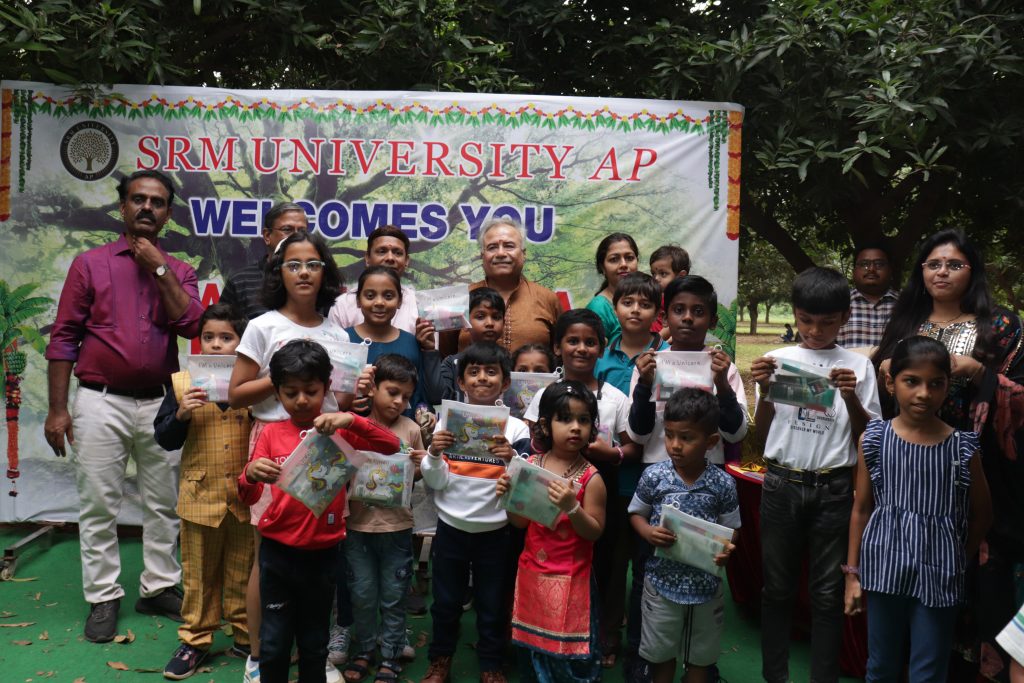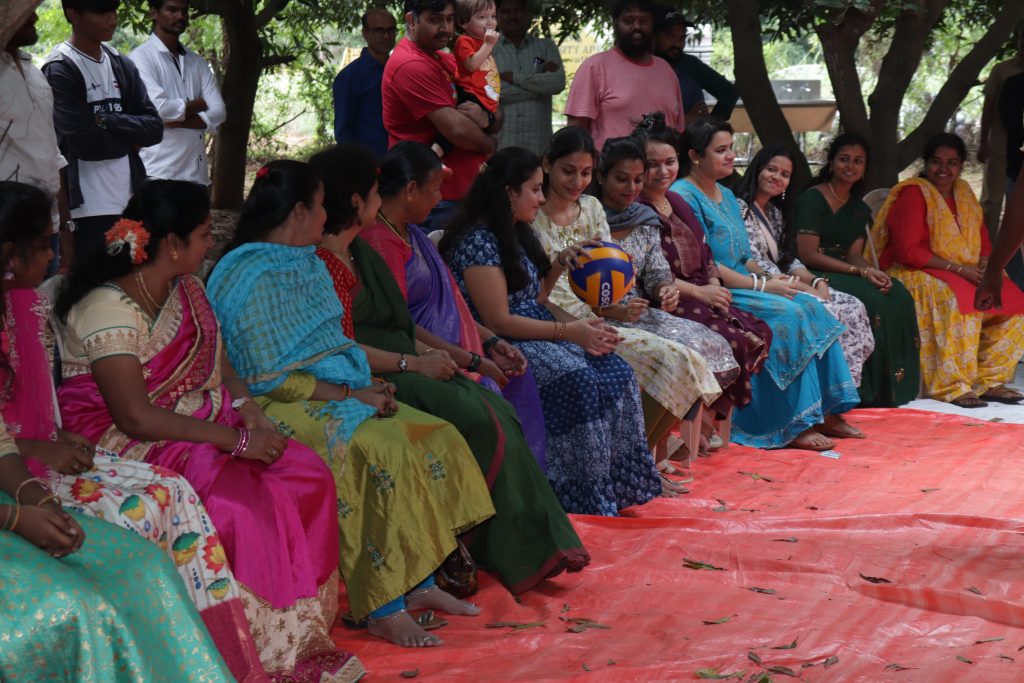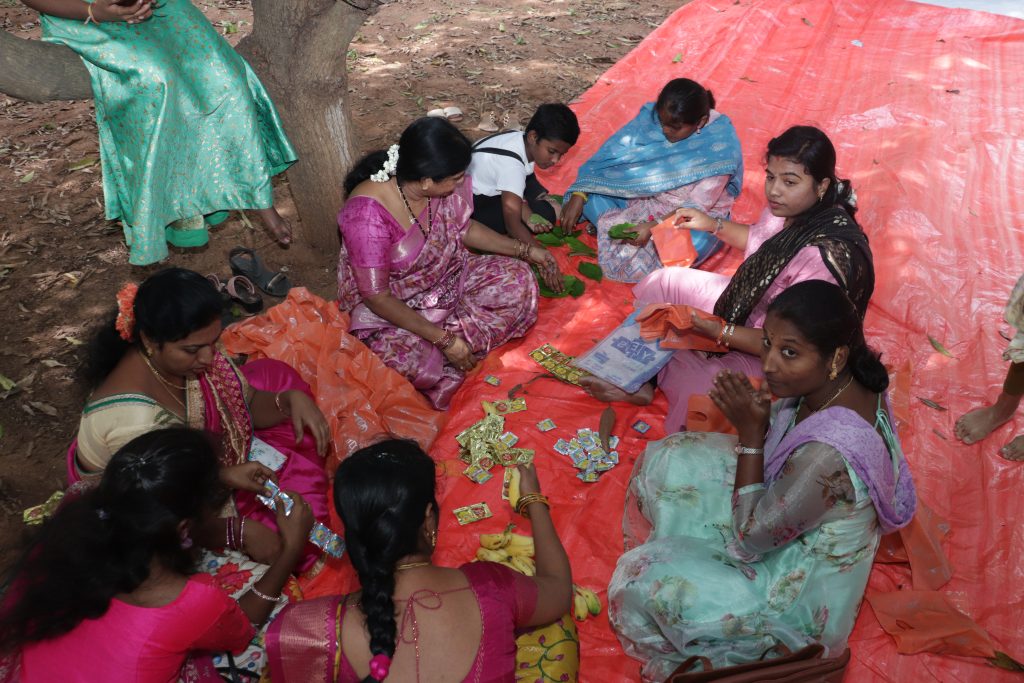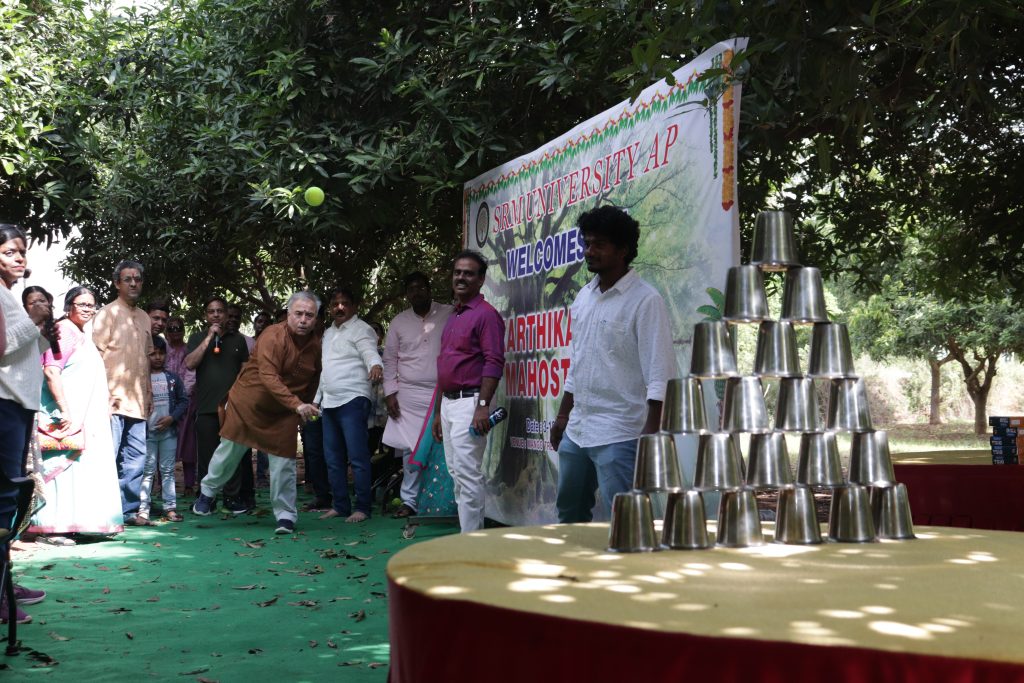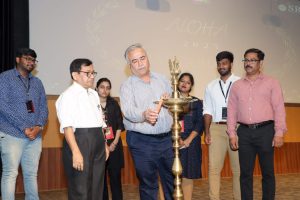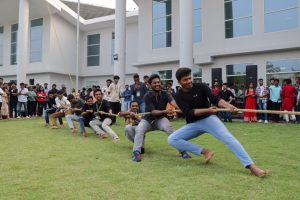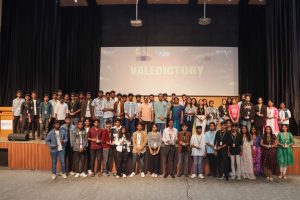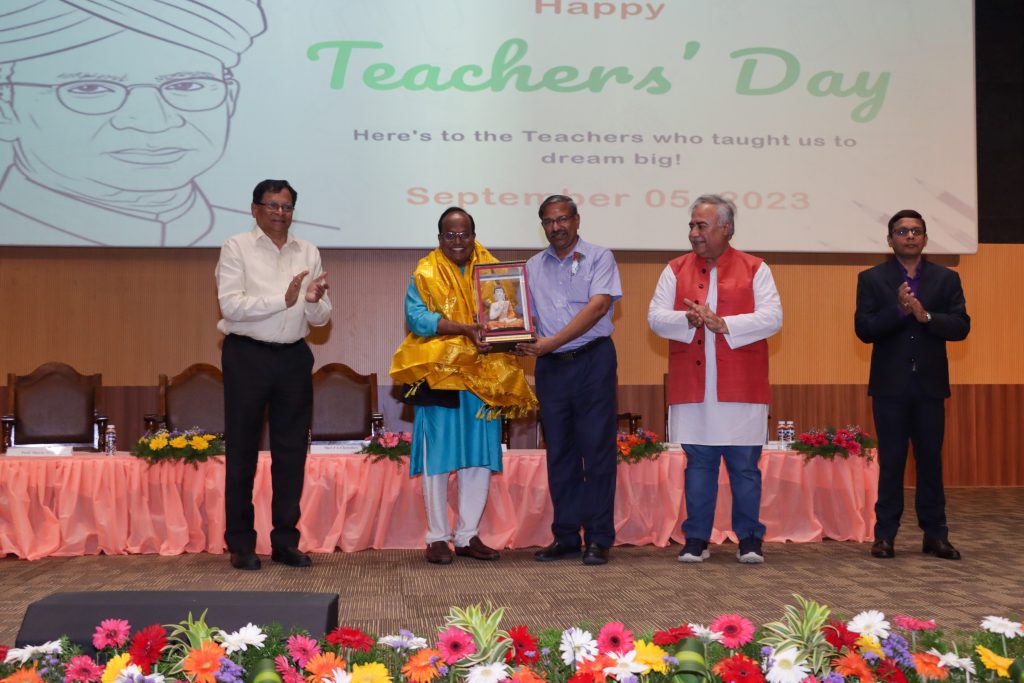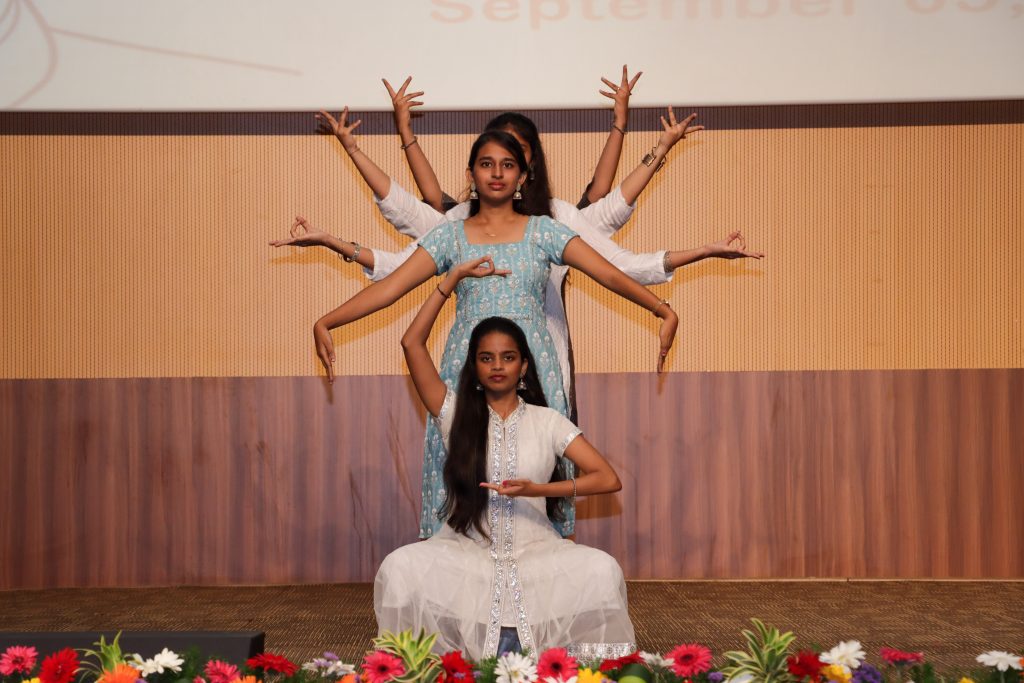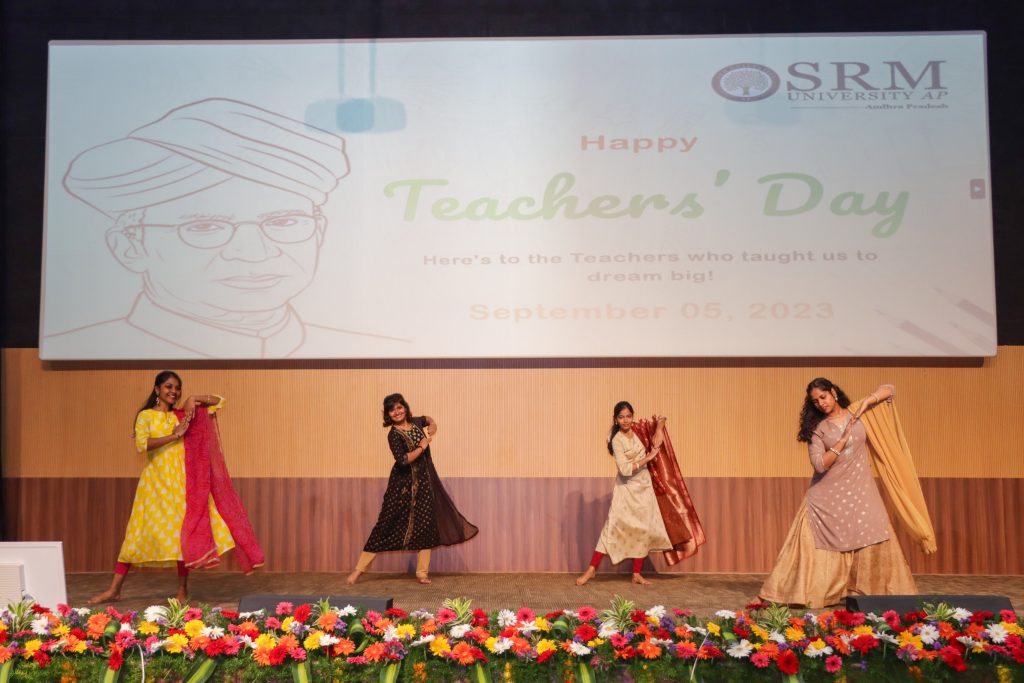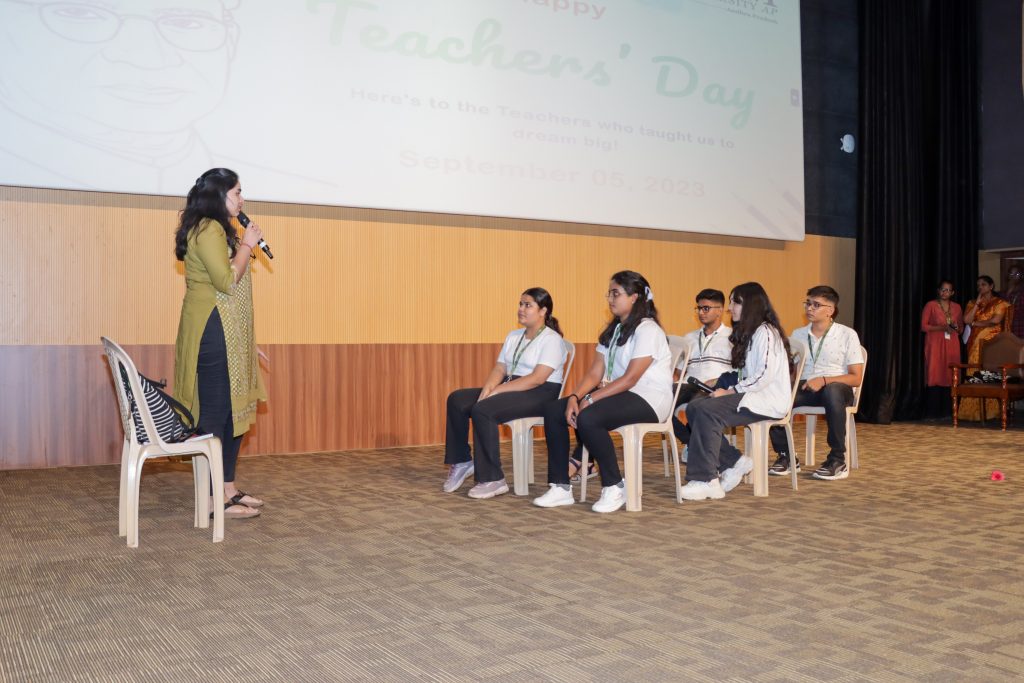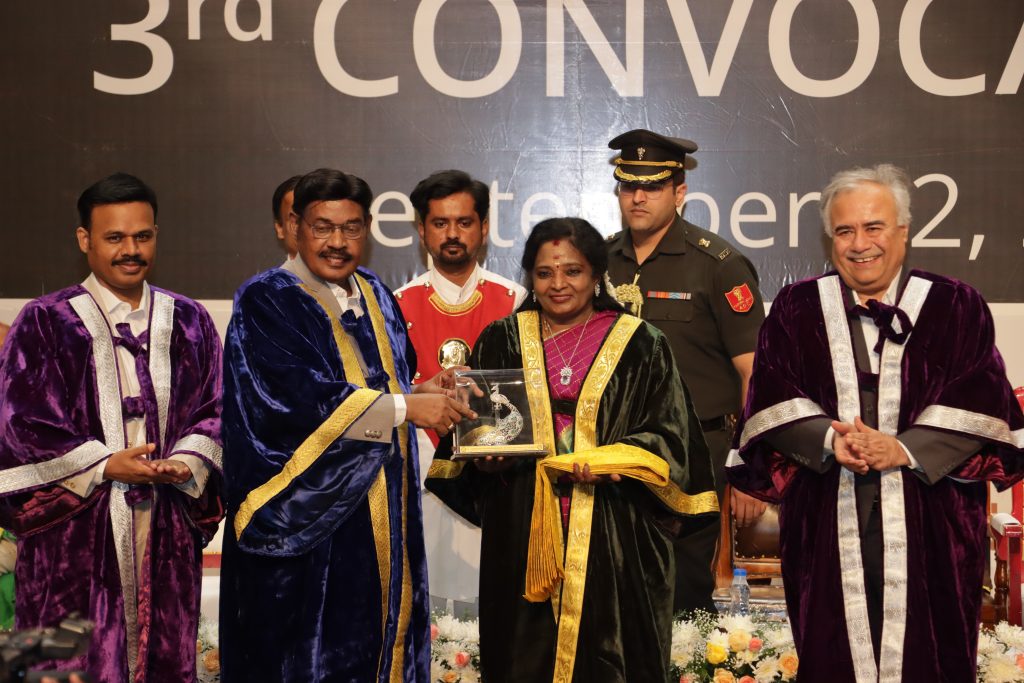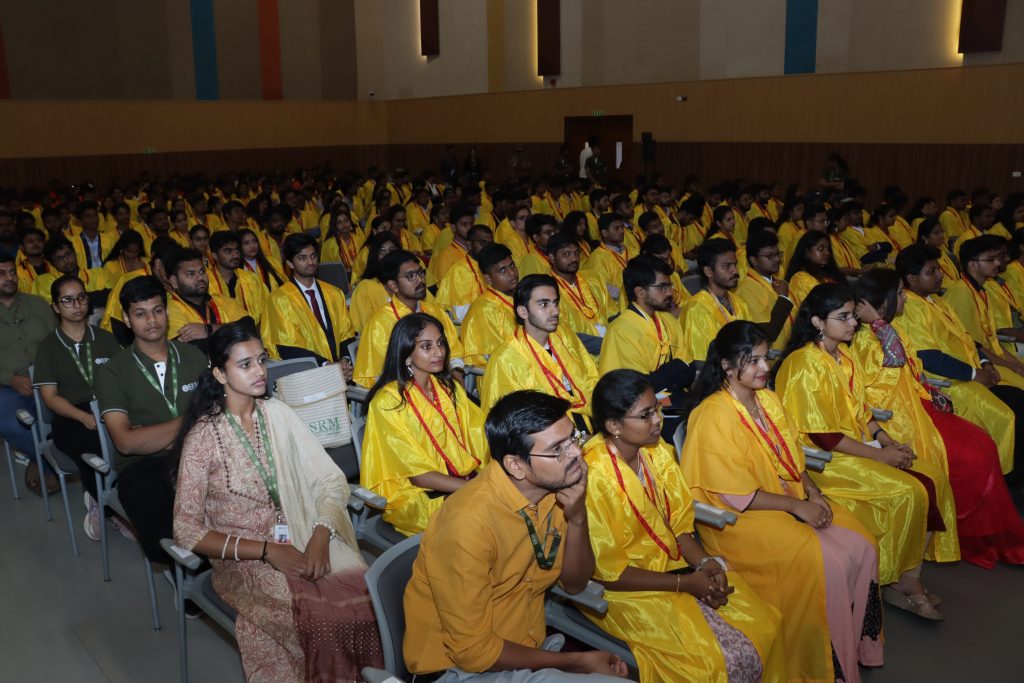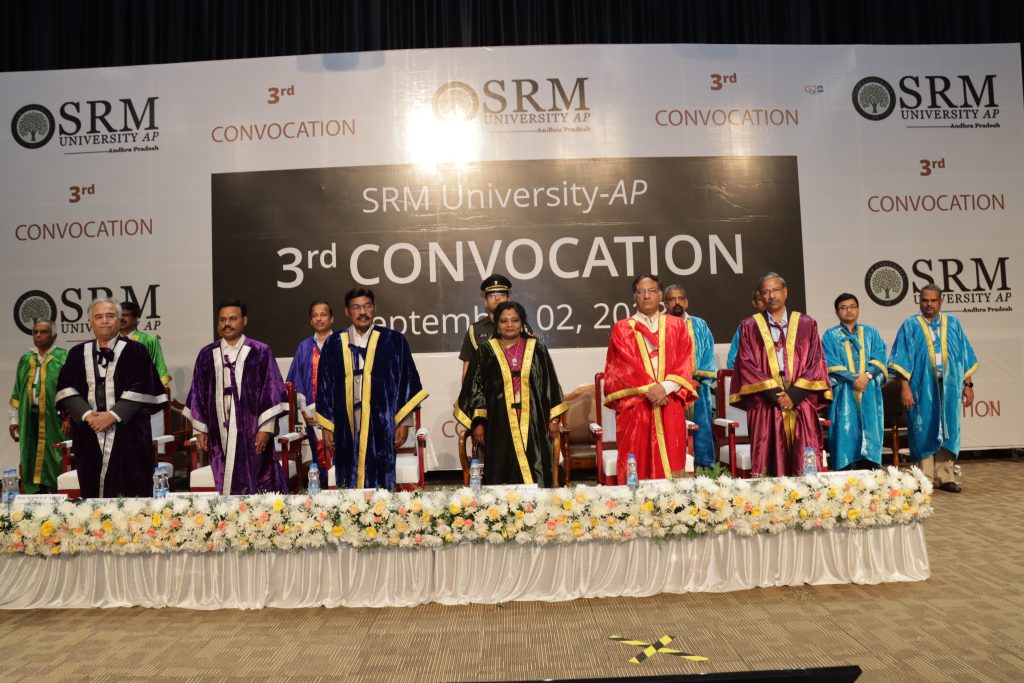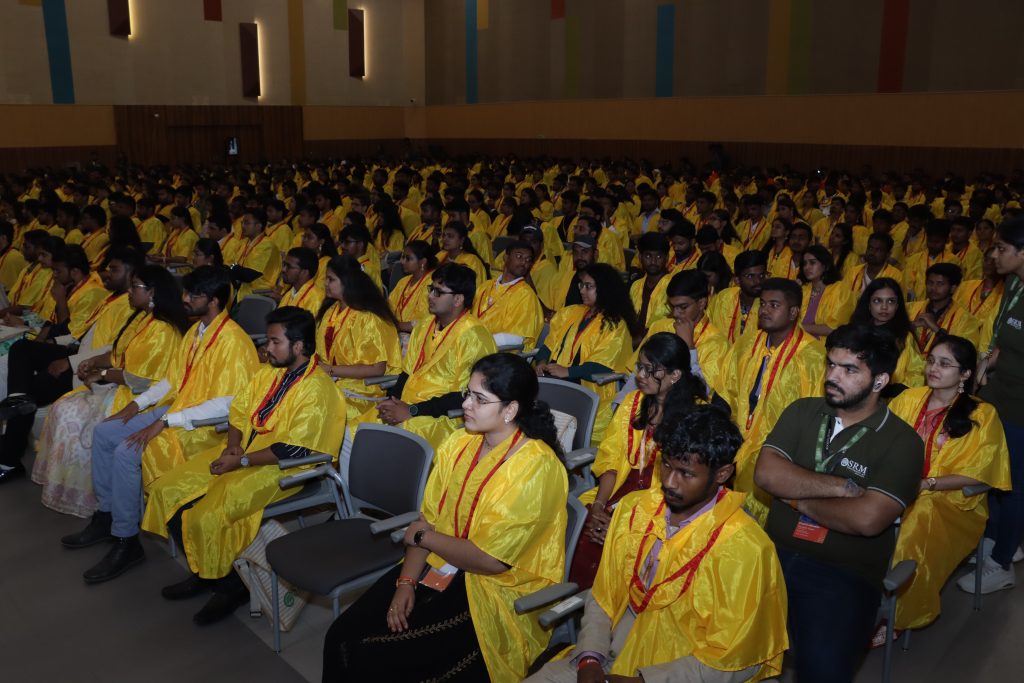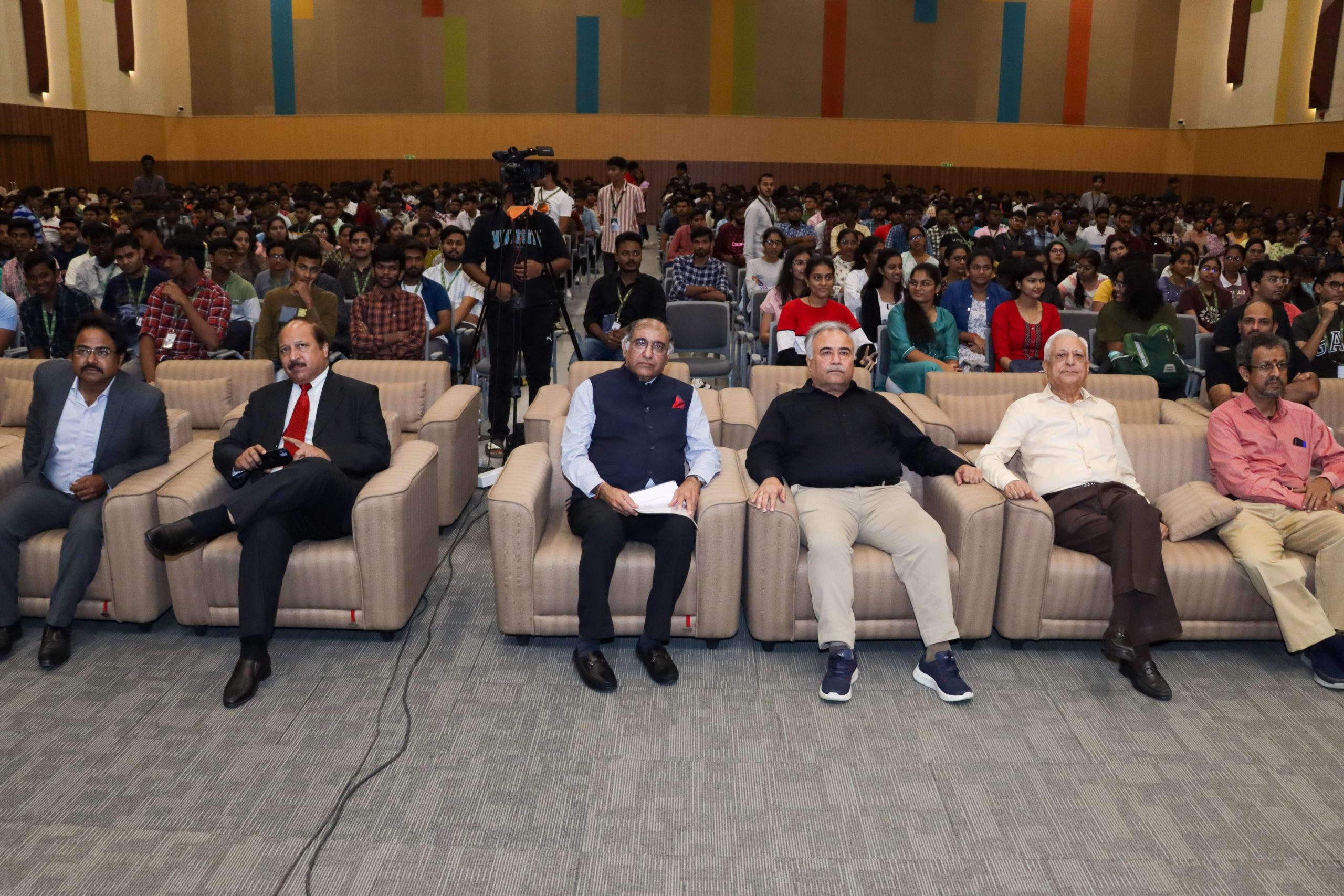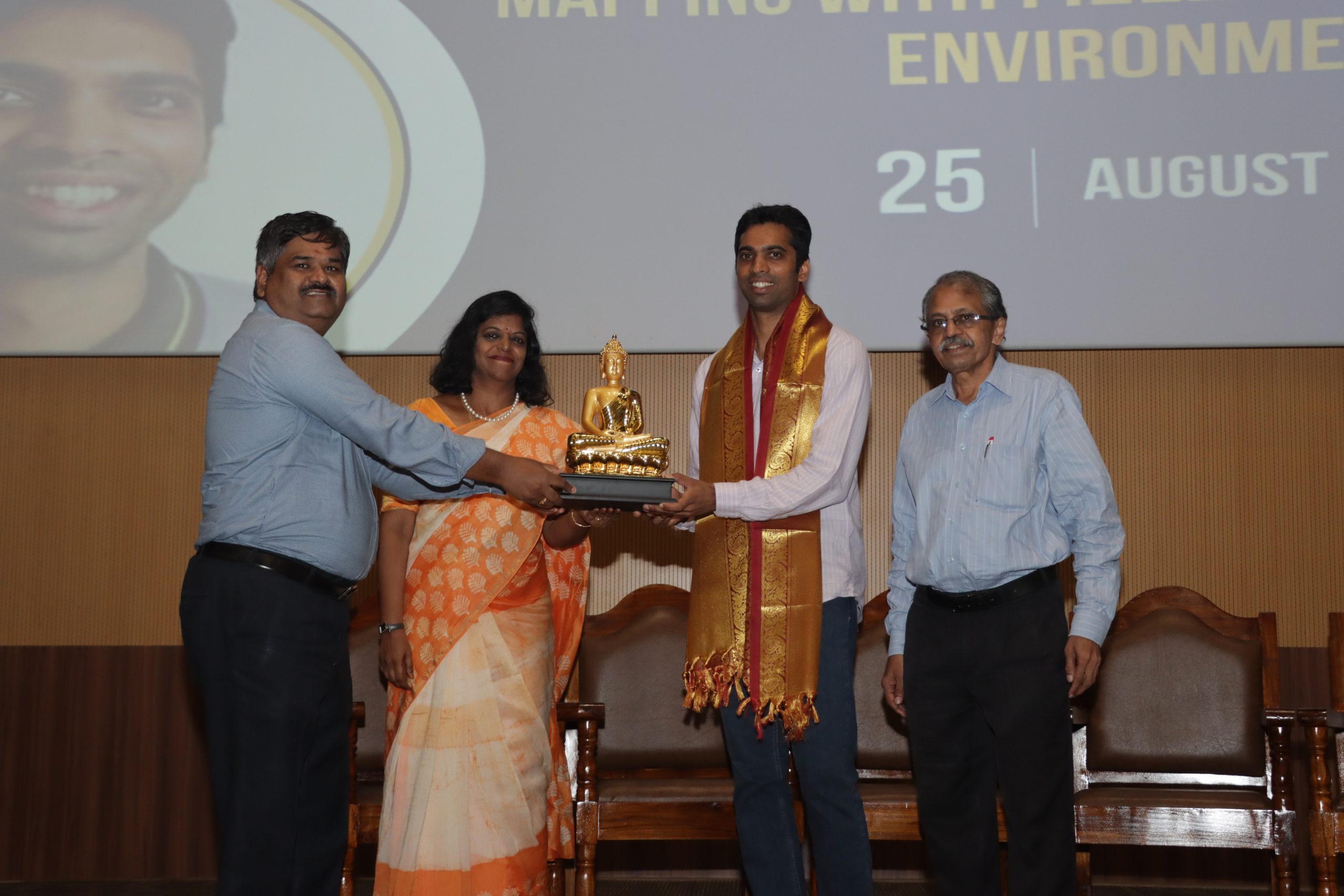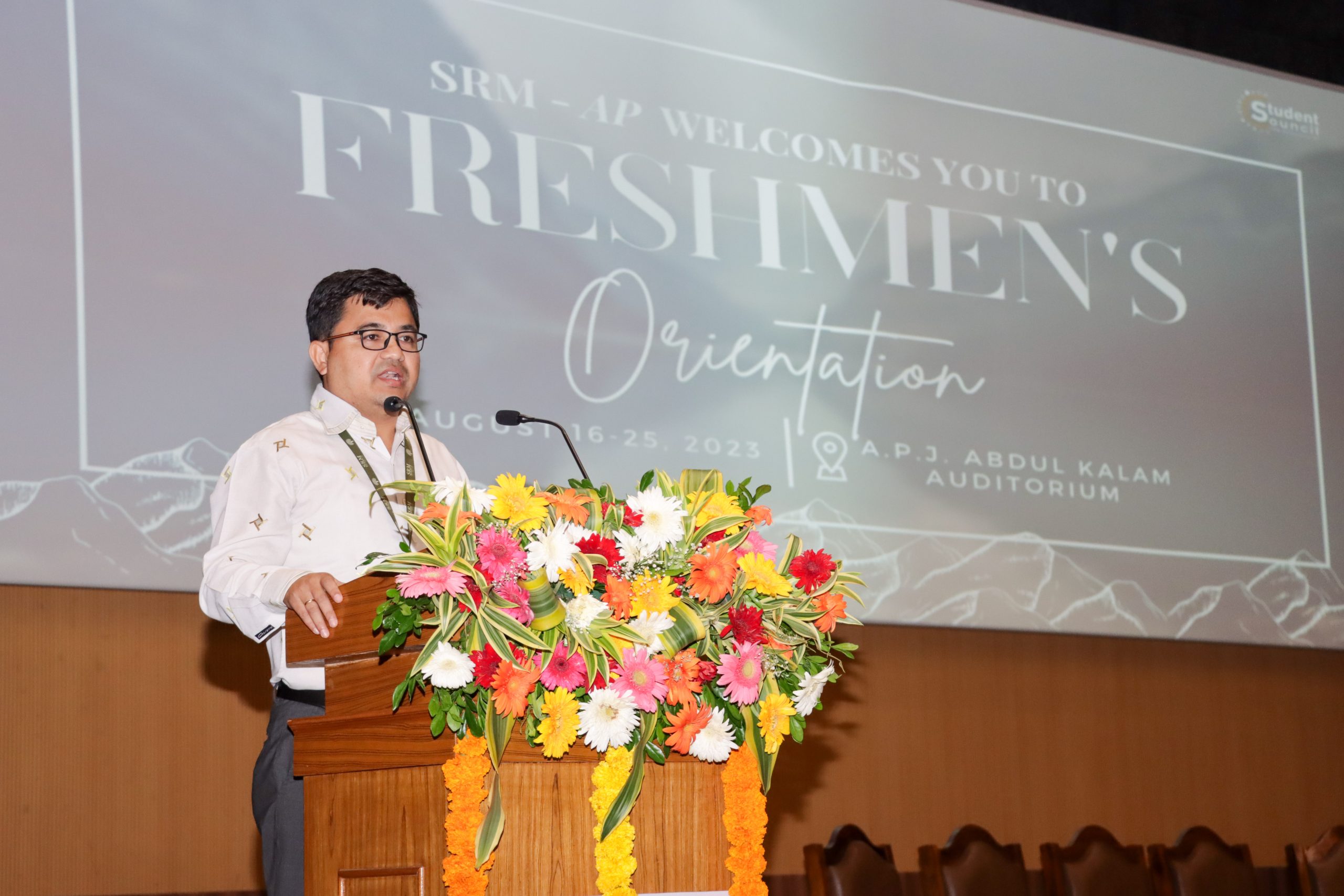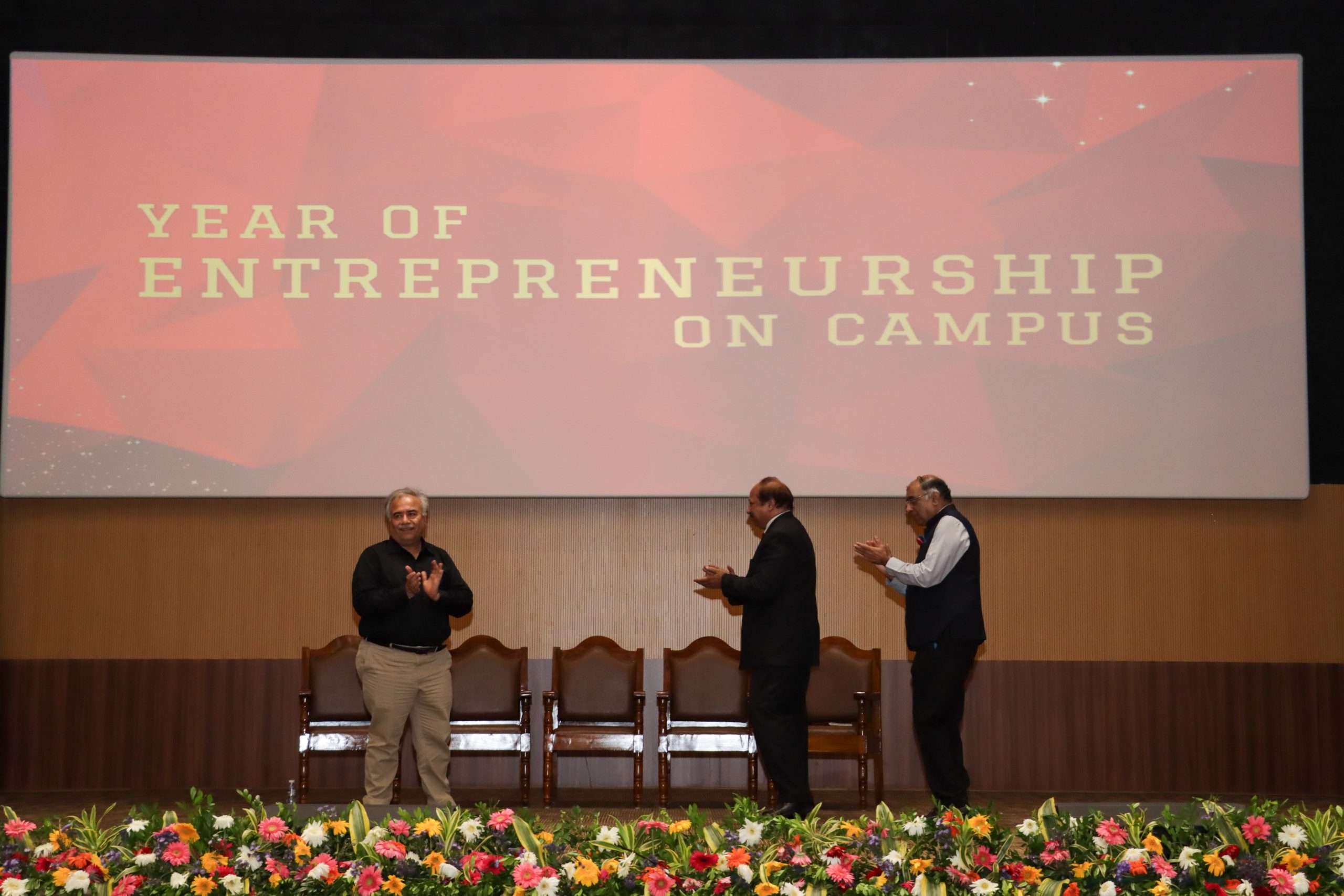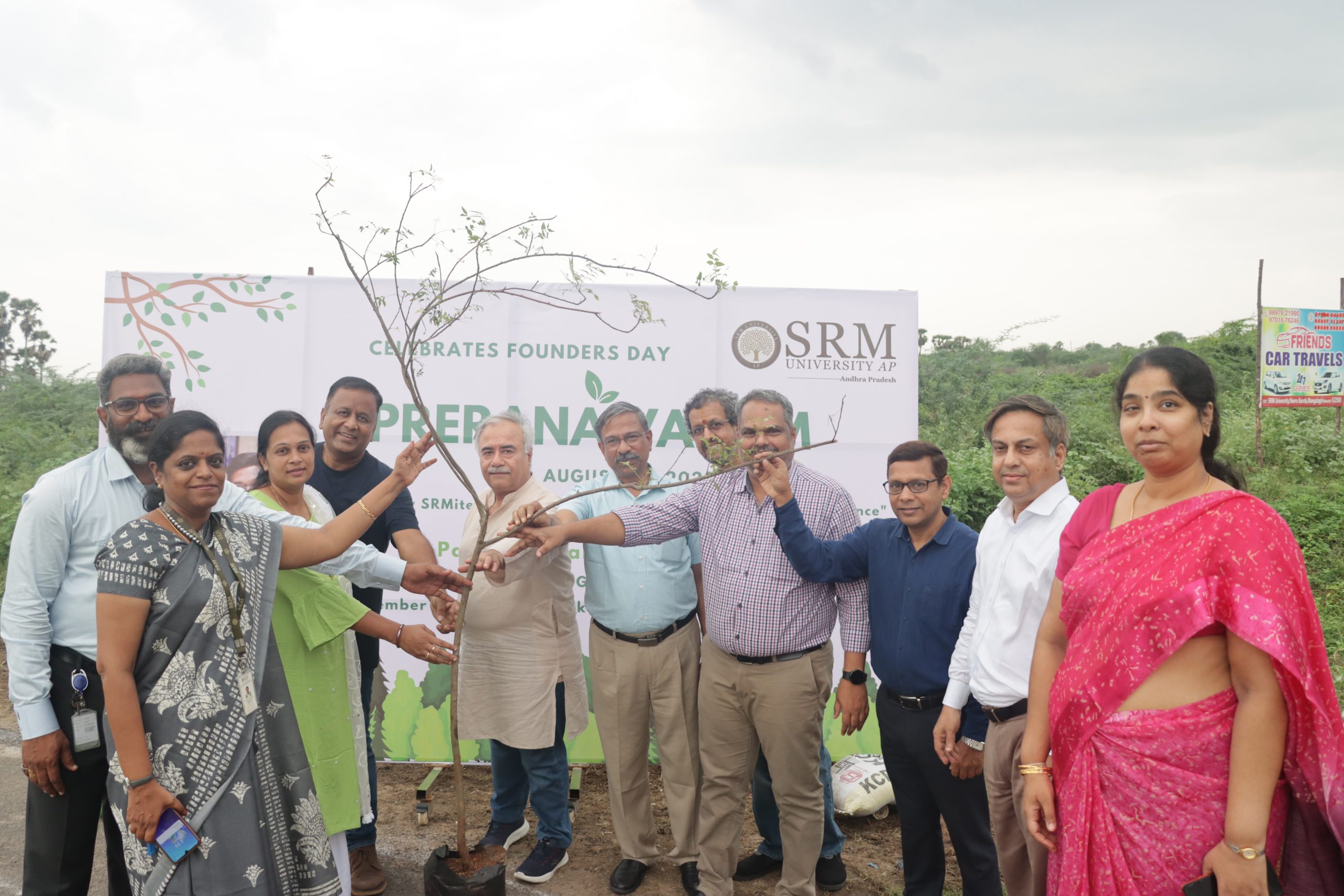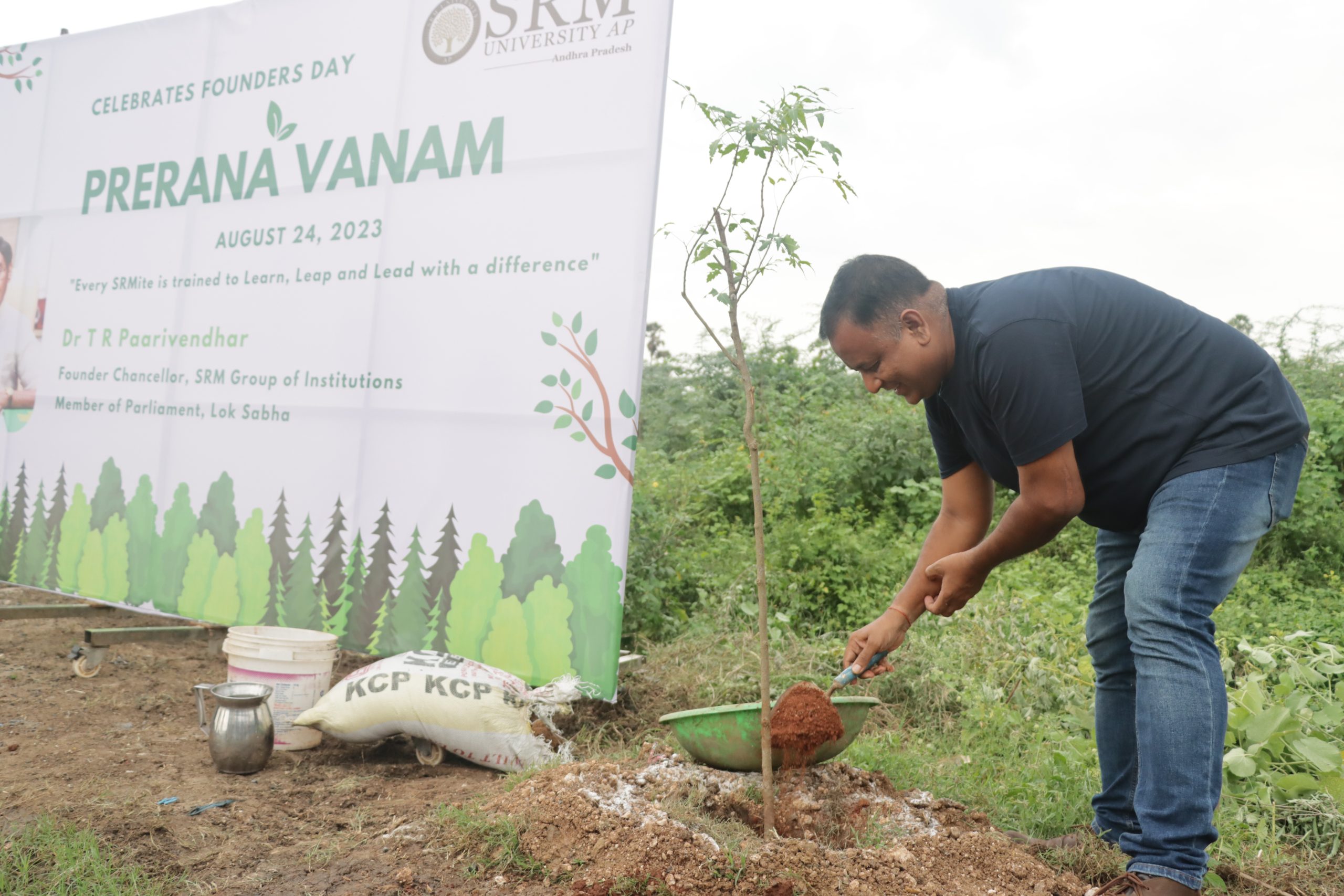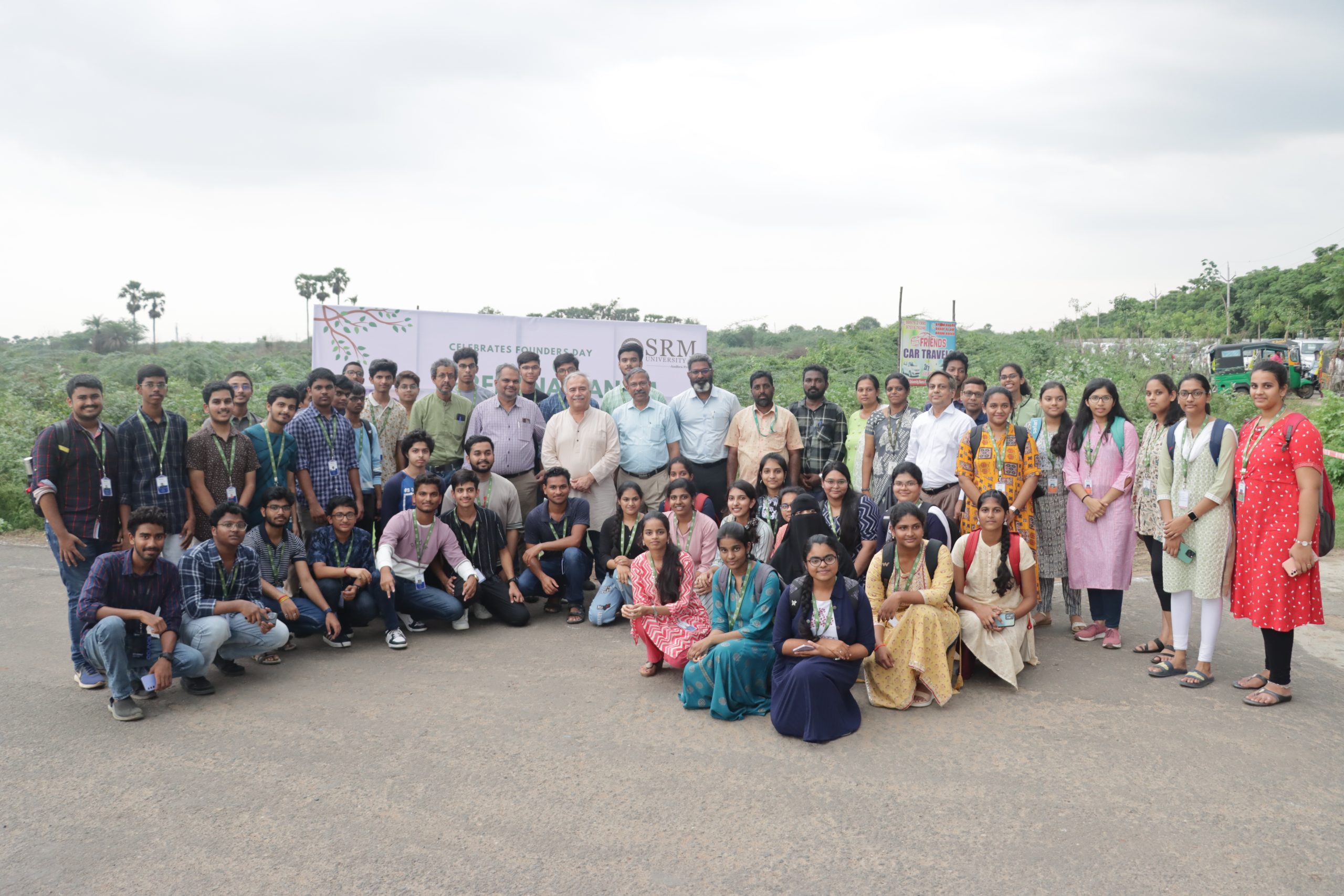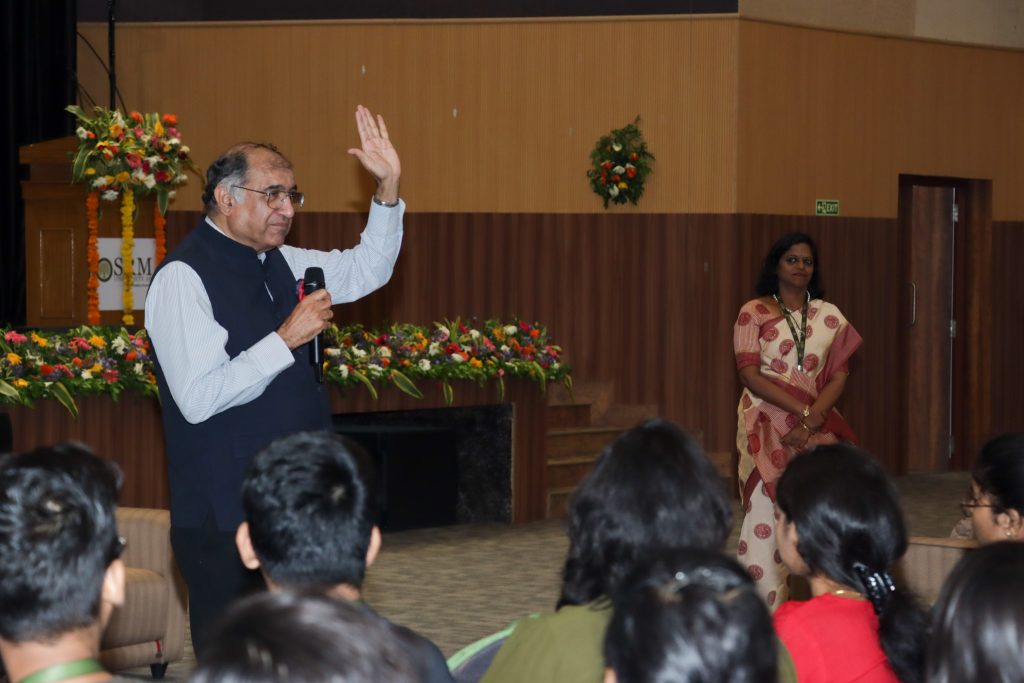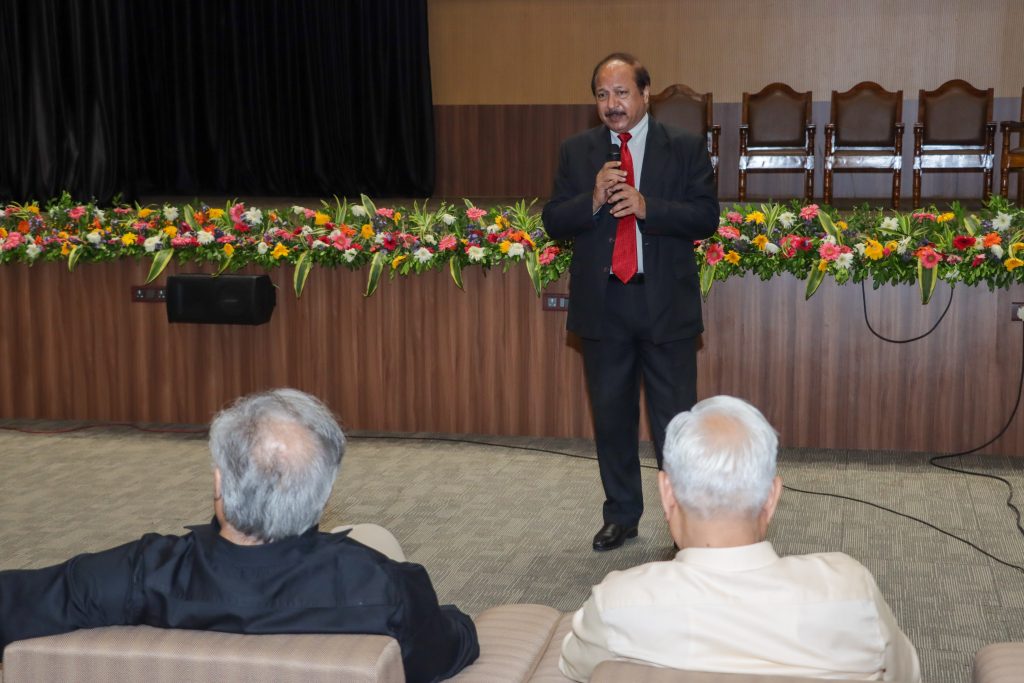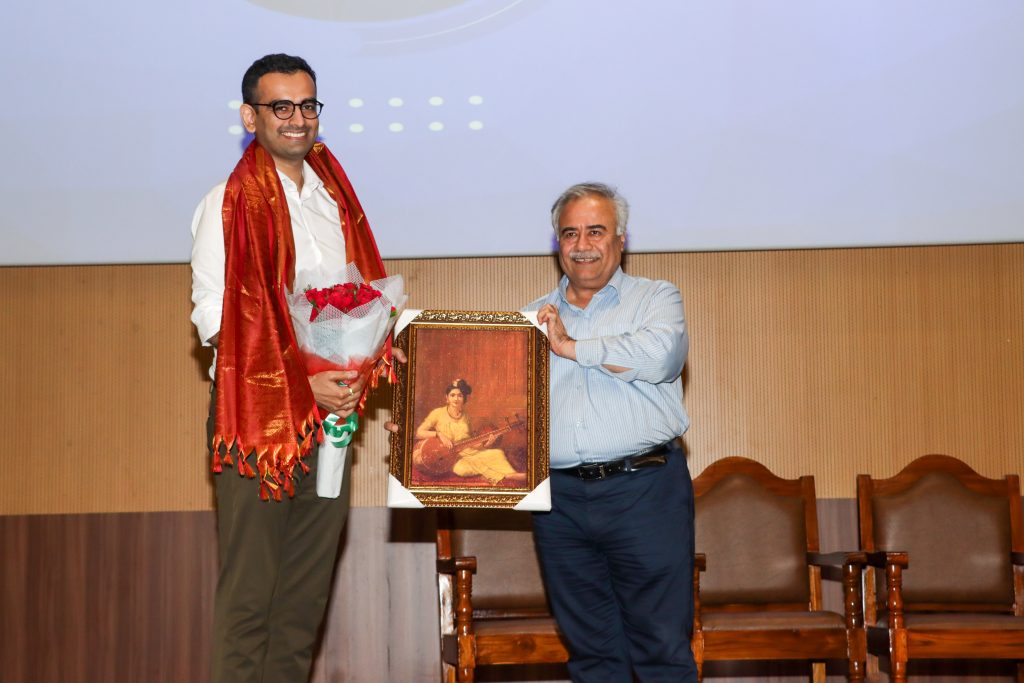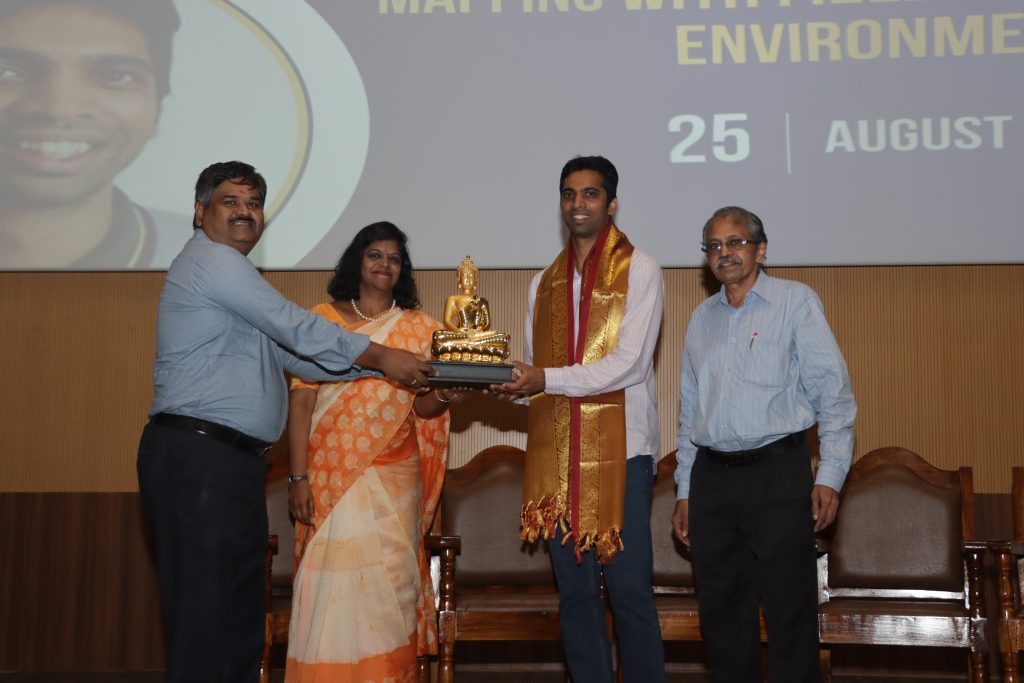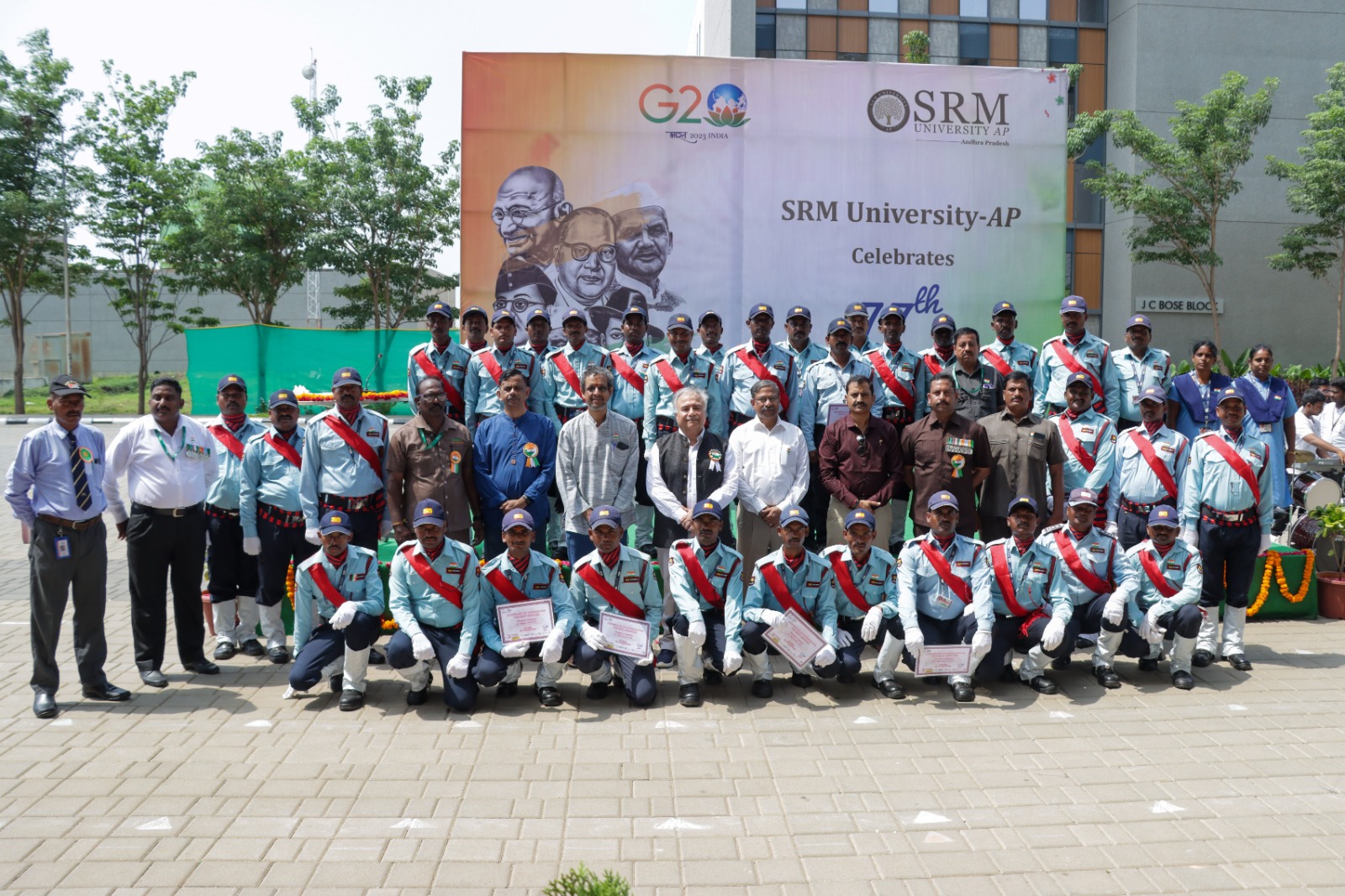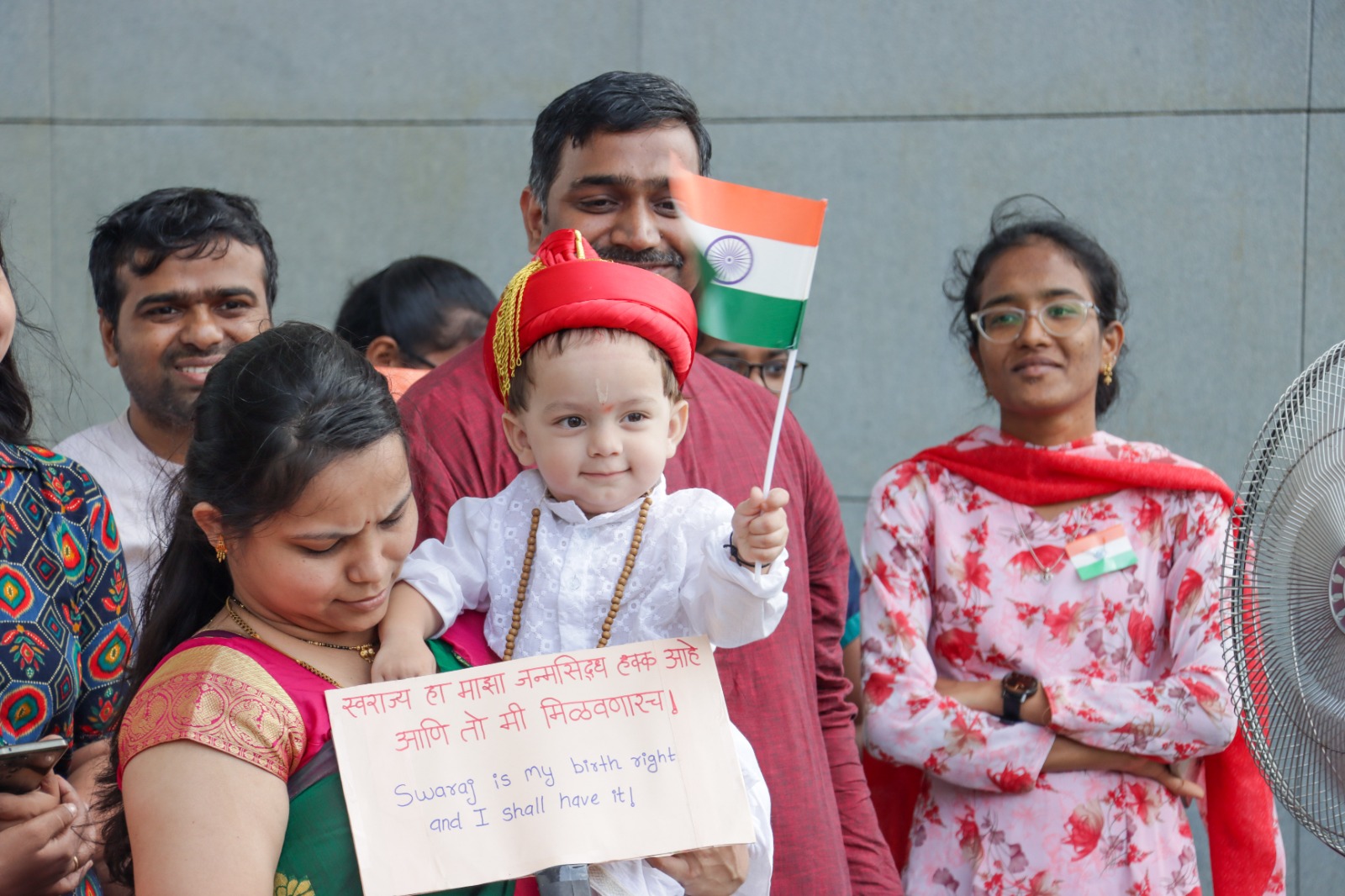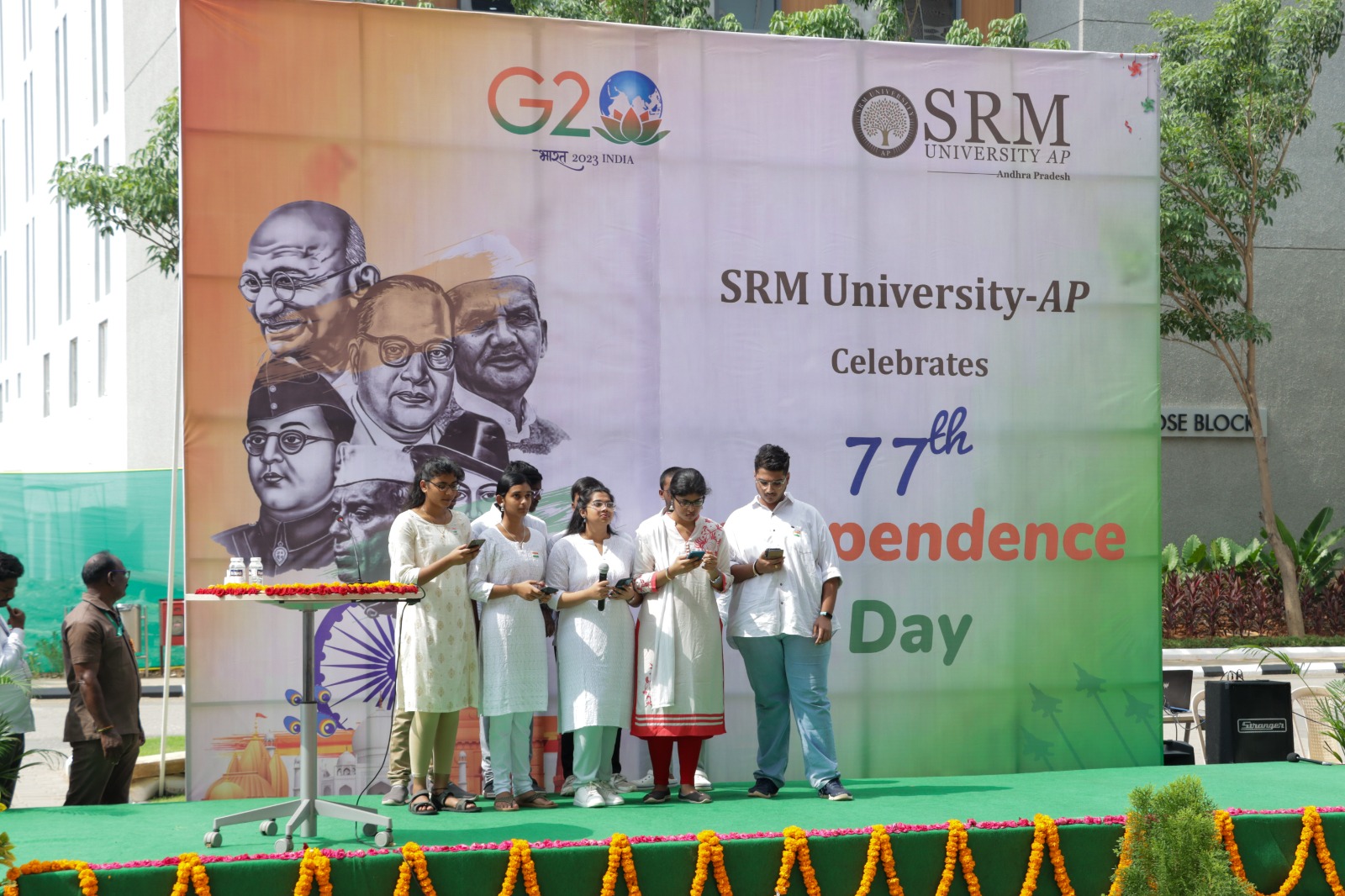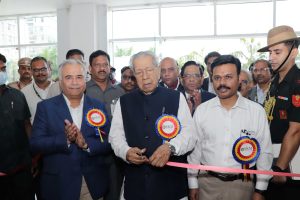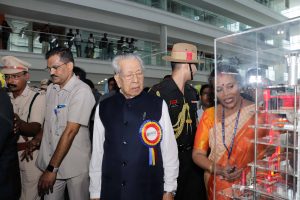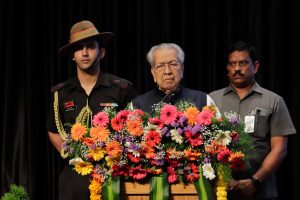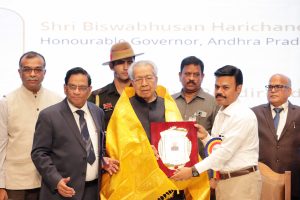Karthik Vana Mahotsava: A Green Celebration of Nature’s Bounty
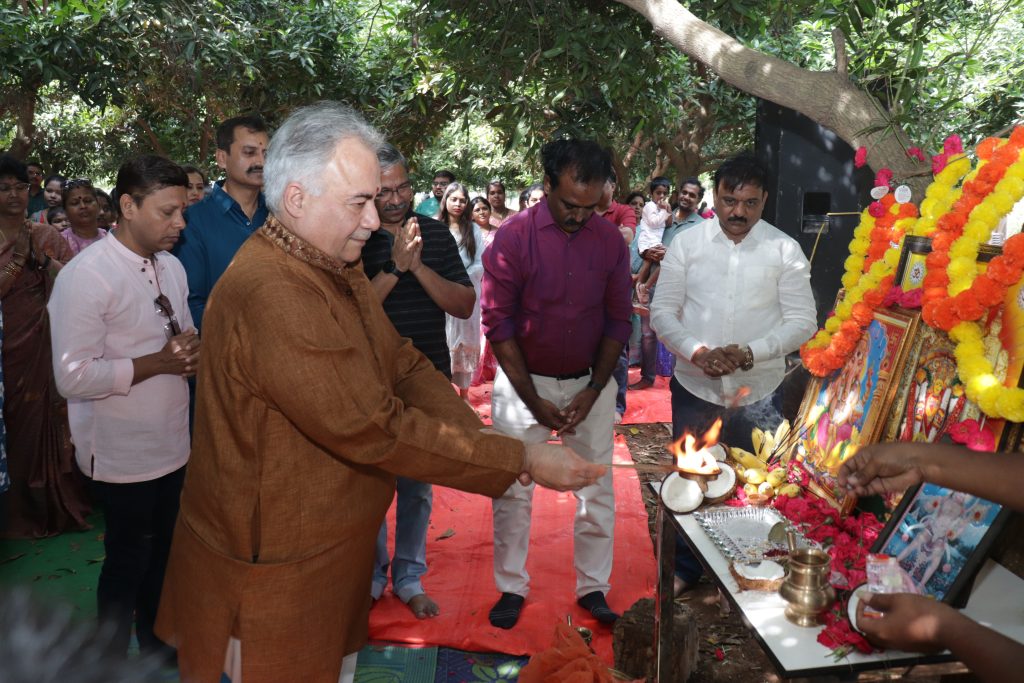
In the Karthik month of the Hindu calendar, a vibrant and eco-friendly celebration, Karthika Vana Mahotsavam took centre stage at SRM University-AP. The varsity honoured the tradition and fostered environmental consciousness with its Vanamahotsavam. This annual event has become a significant tradition in the varsity and draws faculty and staff and their family members from different communities together to celebrate the beauty of the earth and promote sustainable living.
The celebration that took place in the Mango Gardens, near Sri City in Nidamaru saw the participation of members of the leadership including Vice Chancellor, Prof. Manoj K Arora; Registrar, Dr R Premkumar, Directors and former members of the leadership. The Vana Mahotsava intended to honour both nature and celebrate the bond between humans and nature was organised by the Directorate of Human Resource Management.
The event also saw children and families bonding over games and other exciting activities organised by the Directorate. Vanamahotsavam was a holistic way of fostering a sense of responsibility for future generations and served as a reminder that small, concerted efforts can contribute significantly to the global movement for a greener and more sustainable planet
- Published in News, University Event
ALOHA 2023: The Party of The Year Concludes With a Bang
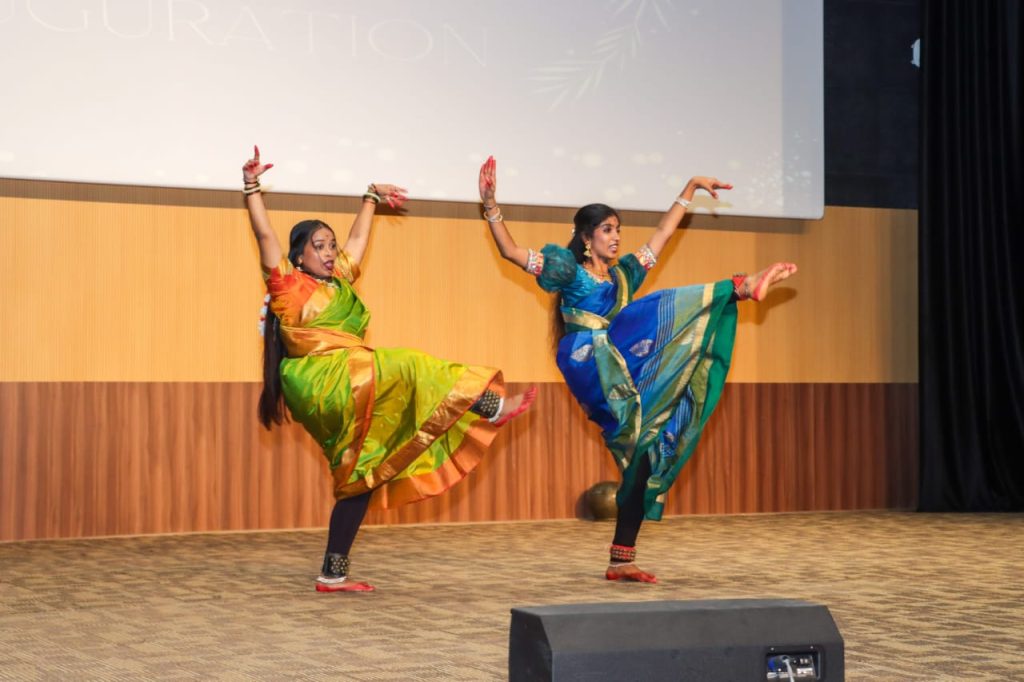
SRM University-AP successfully concludes its Freshers’ Party of the year, ALOHA 2023, with extravagance. The two-day freshers’ event was inaugurated by Vice Chancellor, Prof. Manoj K Arora on October 13, 2023, in the presence of Director of Student Affairs, Mr Anil Kumar Nigam, Asst. Director of Student Affairs, Ms Revathi Balakrishnan, Visiting Professor-Paari School of Business, Prof. Prabal K Sen, and the President and Vice President of the Student Council.
“The word ‘Aloha’ embodies compassion and kindness. We welcome you to your second home, SRM University-AP where we will nurture you to be holistic individuals throughout your academic journey” stated Prof. Arora in his inaugural address. The Director of Student Affairs welcomed the freshers into the academic and social community of the university. “SRM University-AP is a place for creating friendships, exploring your potential and being the best version of yourself!” Mr Nigam addressed the freshers.
ALOHA featured a Mr and Ms Freshers’ Contest that witnessed a spectacular display of talent by the students of SRM University-AP. Dhruv Narayan Bajaj and Vaishnavi Kasturi were crowned as the Mr and Ms Fresher of 2023, respectively. Various creative club activities and competitions from photography to dance and music, to anime quiz and cubing, and traditional games such as tug-of-war and Dahi Handi are some of the innumerable activities conducted as part of the freshers’ programme. The event successfully concluded with an exclusive DJ party featuring Project 91, Prithvi Sai and international artist DJ Pozitiva.
- Published in News, student affairs news, University Event
Faculty Honoured for Outstanding Services on Teachers Day Celebration
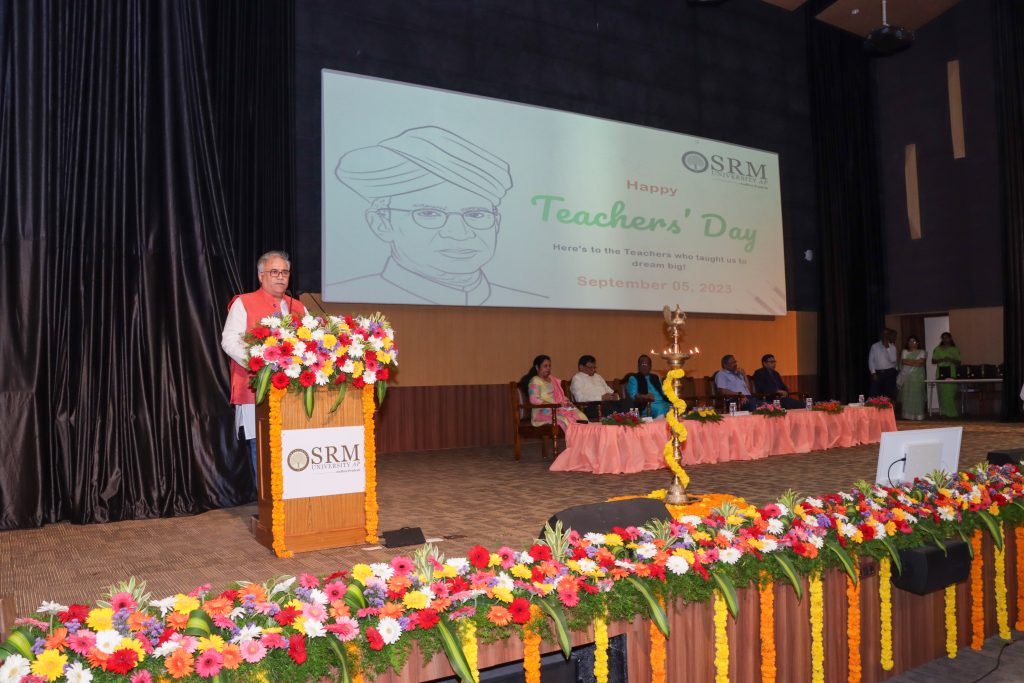
SRM University-AP enthusiastically joins the global flare of Teachers’ Day festivities, to honour and appreciate the incredible services of the teaching community. Students and staff of the varsity joined hands to put forth a heartfelt tribute to their exemplary services.
The programme saw the participation of Mr J A Chowdary as the distinguished Chief Guest for the event. Mr Chowdary is an Entrepreneur, Technology Leader and Innovator and is credited as one of the key architects of the HI-TECH City and Cyberabad in Hyderabad and in founding the International Institute of Information Technology Hyderabad (IIITH), and the International Institute of Digital Technologies (IIDT) at Tirupati.
During the occasion, Vice Chancellor, Prof. Manoj K Arora cited, “We are moving from the role of teachers to that of mentors and facilitators”. He took the opportunity to enlist the core values of the university, namely Show Compassion, Develop Trust, Give Mutual Respect, Create a sense of Curiosity, Serve with Integrity and Instil Social Responsibility and encouraged the faculty to align themselves to the same. Prof. Arora also announced five prominent awards for the Research Day to be held on November 17, 2023. The awards will be given out in the categories of Best Experimental Researcher, Best Theoretical Researcher, Best Industrial Researcher, Best Social Researcher and Best Young Researcher Award.
Chief Guest, Mr J A Chowdary spoke in his address on India as a land of opportunities for startups. He stated, “Most jobs in future are going to be automated and existing jobs will disappear.” In an interactive session with students, the guest also quoted that startup failures in Silicon Valley are irrelevant to India’s scenario, as for today, 9 out of every 10 startups are successful.
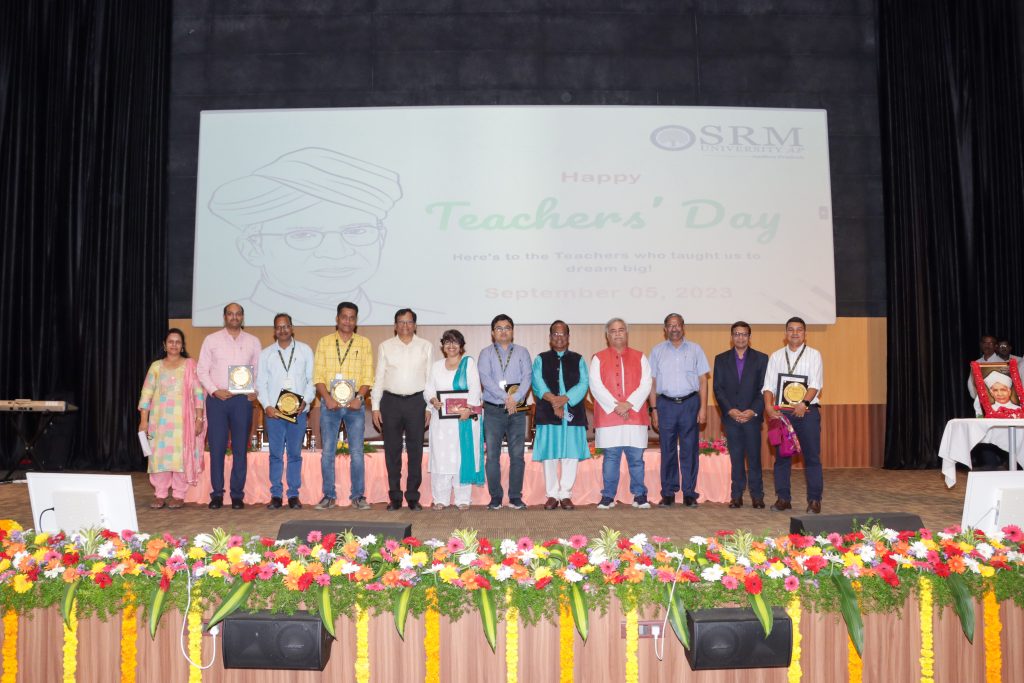
The event also saw the announcement of the Outstanding Teacher Awards. Prof. Ranjit Thapa, Dean i/c-School of Engineering and Sciences and Dean-Research; Dr V M Manikandan, Assistant Professor, Department of Computer Science and Engineering; Dr Jatindra Kumar Dash, HoD, Department of Computer Science and Engineering; Dr Murali Krishna Enduri, Assistant Professor, Department of Computer Science and Engineering; Dr Srabani Basu, Associate Professor & HoD, Department of Literature and Languages; and Dr Karthik Rajendran, Associate Dean-Quality and Assurance Rankings & HoD, Department of Environmental Science and Engineering were honoured with the Outstanding Teacher Awards. The award recipients were also seen delivering an acceptance speech and expressing their gratitude to the varsity and students.
The ceremony witnessed the varsity awarding the Five Year Services Award to its dedicated employees. The event concluded with students putting up beautiful performances for their beloved teachers and other memorable moments.
- Published in News, University Event
Hon’ble Governor of Telangana Felicitates Graduates at the 3rd Convocation Ceremony
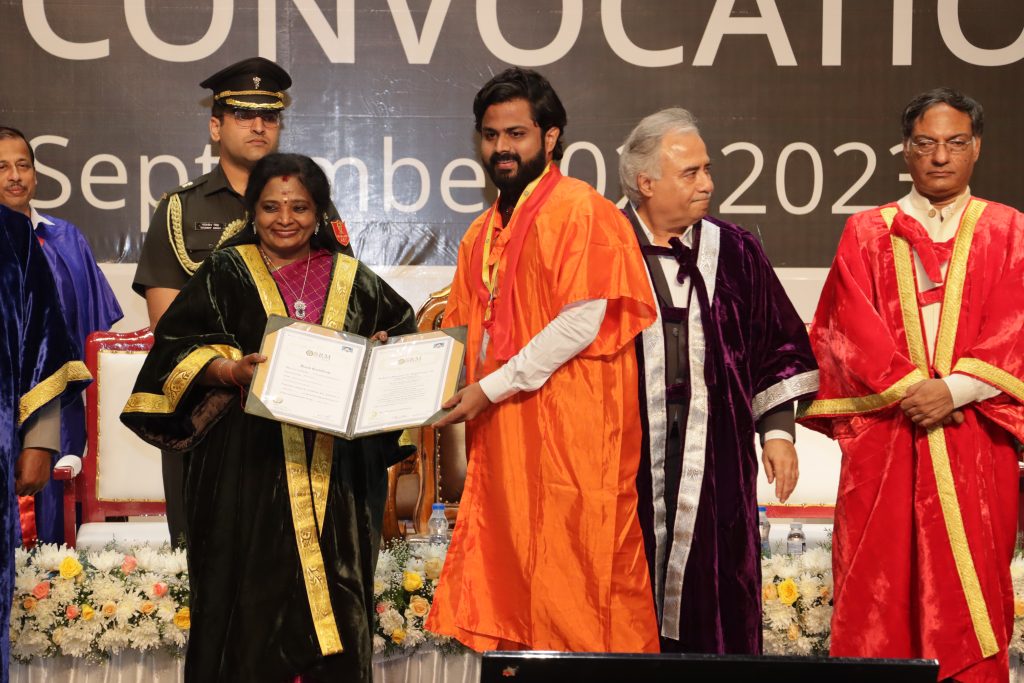
“Education provides you confidence. Sharpen your skills each passing day and visualise the development of your nation. Learn more than expected and earn more than expected is the ideology that we live by today”, Her Excellency Dr Tamilisai Soundararajan, Hon’ble Governor of Telangana, the chief guest of the 3rd Convocation Ceremony of SRM University-AP remarked while addressing the graduating Class of 2023.
The university has conferred the prestigious degrees to the Graduate Class of 2023 at the 3rd Convocation Ceremony on September 02, 2023, in the august presence of Guest of Honour, Prof. Ashutosh Sharma, President-Indian National Science Academy; Dr T R Paarivendhar, Founder Chancellor, SRM Group of Institutions; Dr P Sathyanarayanan, Pro-Chancellor; Prof. Manoj K Arora, Vice Chancellor, SRM University-AP; Other dignitaries; Deans of all schools, faculty, staff and parents of the graduating batch. A remarkable 883 graduates, including 13 PhD scholars, 17 Gold medallists, 6 Silver medallists and 2 Bronze medallists were awarded their degrees at the momentous ceremony held at the APJ Abdul Kalam Auditorium.
“In our objective of being globally connected, nationally relevant and regionally transformative university, we have adopted a five-year strategic plan with five goals – Achieve academic excellence, Intensify research, innovation and entrepreneurial spirit, Enhance student experience, Attain financial sustainability and Improve perception and visibility”, stated Vice Chancellor, Prof. Manoj K Arora in his welcome address. During his briefing about the annual report, Prof. Arora also highlighted the placements excellence of the past academic year. He commented, “In the last academic year, we have witnessed 100% placements with the highest package being 45 LPA and average salary of 9 LPA which is a 25% increase from last year. 15 students have received international offers from countries such as USA, Australia, Japan, Sweden etc. As we host the 3 rd convocation of the institute, we are proud to say we are a young university with 1500 alumni, of which 34% of them are working in Fortune 500 companies, 17% are studying abroad, 7 have their own startups.”
Founder Chancellor, Dr T R Paarivendhar, in his address to the young graduates, commented that India’s first solar launch, Aditya L1 and our country’s presidency over the G20 summit coincided with the students’ graduation and encouraged them to strive for excellence with love for family, their alma mater and country in their hearts. “Success in life needs to be balanced with philosophy and spirituality. SRM University-AP has prepared you for the transition of student to alumni, by imparting knowledge and the skill to learning how to learn. Use the skills you have acquired to pursue prosperity and contribute to the growth of society”, advised Pro-Chancellor, Dr P Sathyanarayanan on this milestone event.
The university also conferred an Honorary Doctorate to Prof. Ashutosh Sharma, esteemed Guest of Honour by the Founder Chancellor, Dr T R Paarivendhar and Hon’ble Governor for his exemplary contributions to the field of sciences. “Success and inclusive development is going to be a global challenge. As we continue to progress at an unprecedented pace, remember that new knowledge is no knowledge without using it for socio-economic good” stated Prof. Sharma in his address. He deeply appreciated how research is ingrained into the very fabric of the varsity’s educational approach assuring research opportunities to the young researchers of our country.
The convocation ceremony successfully concluded with the administration of the pledge by the graduation cohort, honouring the national anthem and the departure of the dignitaries.
- Published in News, University Event
Fostering Global Perspective in Education
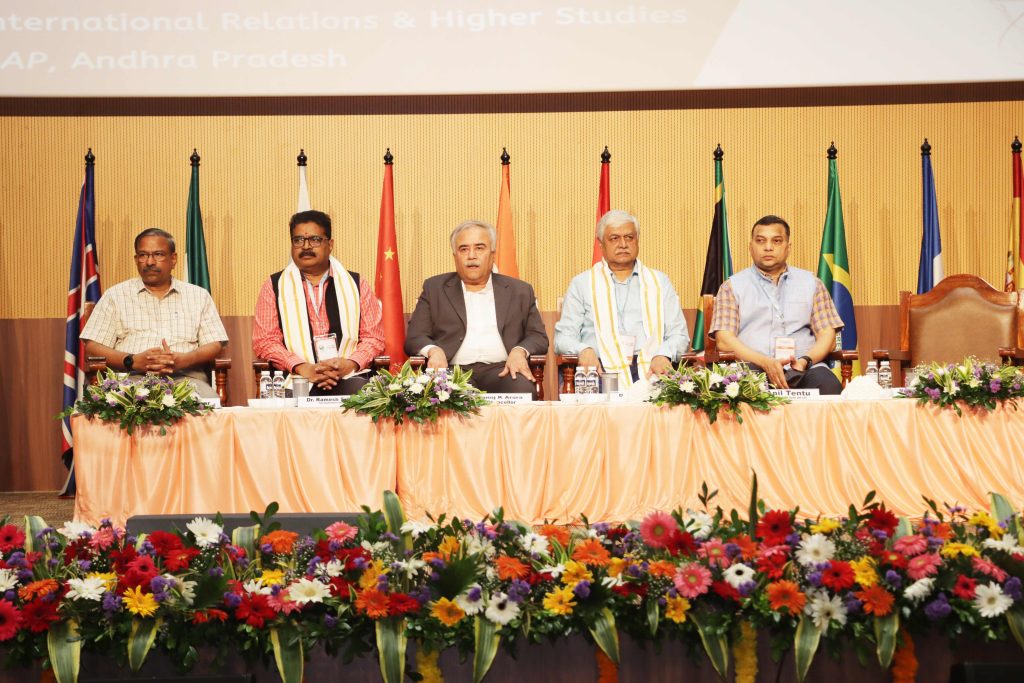
As part of its initiative to whittle the future of education, The Directorate of International Relations and Higher Studies under the aegis of SRM University-AP has organised a Global Principal Conclave that saw the participation of 50+ Educational Leaders from across 15+ countries. Throughout the conclave, the educational leaders were seen exchanging thought-provoking discussions, and innovative teaching approaches in order to foster a global perspective on teaching and learning.
Distinguished guests, including Dr Mukesh Tripathi, Director of AIIMS Mangalgiri, who served as the Chief Guest, and Dr Ramesh Srikonda, Director of Planning and Architecture, Vijayawada, along with Mr Anil Tentu, CEO of AP Innovation Society, Govt. of Andhra Pradesh, as Guests of Honour, joined delegates from around the world to discuss the importance of the event and praised the university’s initiative in hosting the conclave.
The Conclave also witnessed the historic moment where institutes of excellence like AIIMS, Mangalagiri and SRM University-AP signed an MoU. This new collaboration between the two institutions will prove to be a noteworthy milestone in advancing medical research, education and healthcare in the region. “Although we have been working together, this MoU will further enhance the inter-disciplinary collaboration among the institutions,” said Mr Mukesh Tripathi in his address. In his speech to the delegates, Prof. Manoj K Arora said, “Our objective is to be globally connected, nationally relevant and regionally transformative.”
The conclave also saw multiple panels that deliberated on issues such as holistic development, assessment systems and how they impact the education system, intercultural system of learning and harmony in the realm of education. The panellists who spoke on holistic approaches to measuring educational excellence collectively agreed on the scarcity of teachers who join the profession as a choice. The session also deliberated on the system of assessments in education where, Mr C A Govindrao Naik, CEO & Managing Director, JSS Private School, Dubai opined that “not everything important is measurable and also not everything that is measured is important.”
The Global Conclave ended with a cultural performance by students of SRM University-AP with closing remarks by Dr Swetha Pasupuleti, Director of International Relations and Higher Studies SRM University-AP.
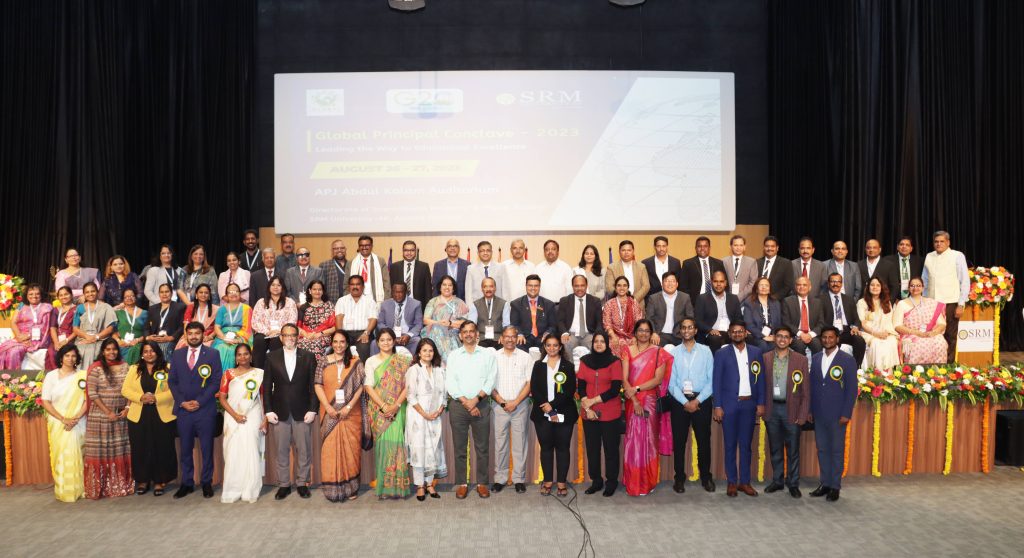
- Published in News, University Event
UDAAN 2023: Freshers’ Orientation Comes to a Close
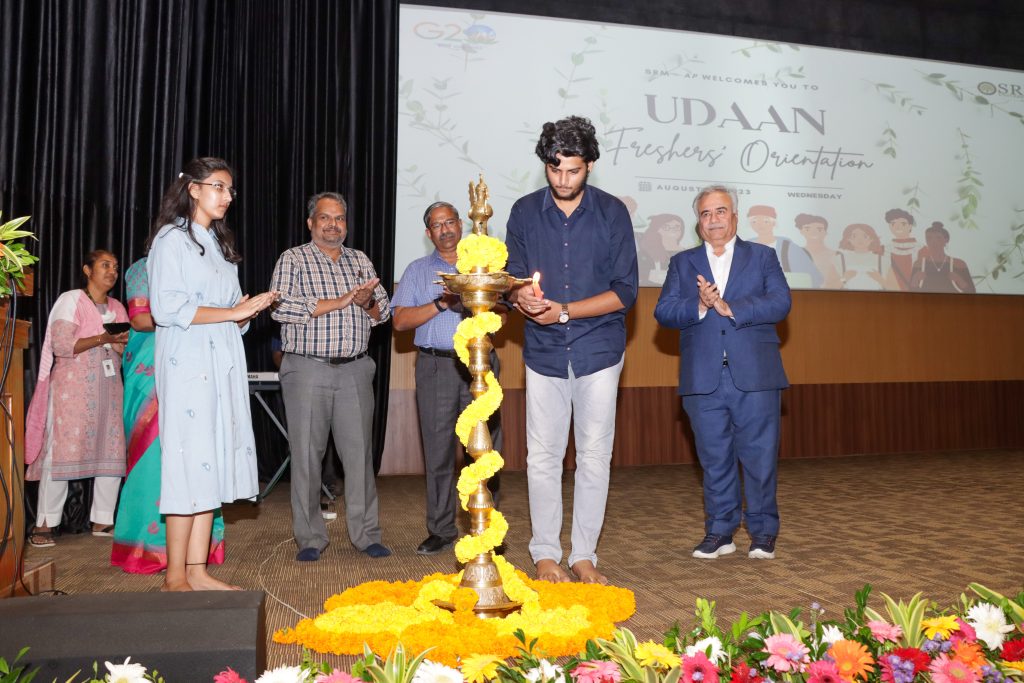
The exciting journey of UDAAN, the Fresher’s Orientation, spanning a vibrant 9 days from August 16 to 25, has come to a close.
Newly enrolled students from diverse parts of the country and the world attended the session. The initial sessions of the Freshers Orientation unfolded with students being inducted into university life. While the second phase of the orientation saw the participation of, industrial experts, entrepreneurs, professors, start-up coaches, and motivational speakers like Prof. Vinay Nangia, Former Professor & Head, Department of Management IIT Roorkee; Dr Dinesh Dua, Executive Director Nectar Life Sciences Limited; Mr Sanjiv Bhavnani, Founder CEO & Chief Mentor Mentorpreneur & Infotecniques Groups; Dr Deepak Pandit, Chair Professor – Innovation and Entrepreneurship I2E; Mr Vivek Atray, ex-IAS officer and, Mr Shiven Tandon, Chartered Accountant and Motivational Speaker; and Dr Nived Chebrolu, a Post-doctoral research scholar from Oxford Robotics Institute.
The distinguished guests helped the students acclimatise with their alma mater. The guests also cited personal experiences and anecdotes with the students making the session more engaging, and lively. The sessions were a two-way street, at the end of which students were allowed a Q and A session with the experts. As part of the orientation, students were also seen enrolling themselves in different clubs and competitions.
On August 25, 2023, Vice Chancellor Prof. Manoj K Arora concluded the 9-day orientation by presenting awards to the winners of the various club competitions. The recipients included: Makadiya Niksham and Nithya Vattikuti from the Acts Club, Praveen Kumar Kommanaboyina and Meghana Nangireddy from the Anime Club, Rungshit Basu and Venkadesh Prasad from the E- Sports Club, Vineesha and Pranadhaa from the Environment Club, Mahalakshmi and Navneeth from the Cinemates Club, Myla Gangadhar from the Quiz Club, Dainik Dubey and Zaara from the Theatre Club, Muppana Ananya Chowdary from the Photography Club, Datha Sai Nemallipuri and Ritwik Paramesh Medidi from the Cubing Club, Gunatit Jariwala and Dakshitha Susheela Popuri from the Yoga and Meditation Club, Y Vishnu and Hiti from the Dance Club and Jahnavi Jyotimari Aravelli from the Wellness Club.
UDAAN, the Freshers’ Orientation definitely offered a preview to the newcomers of what lies ahead of their glorious academic life.
- Published in News, University Event
Celebrating the Legend Dr T R Paarivendhar on his Birthday
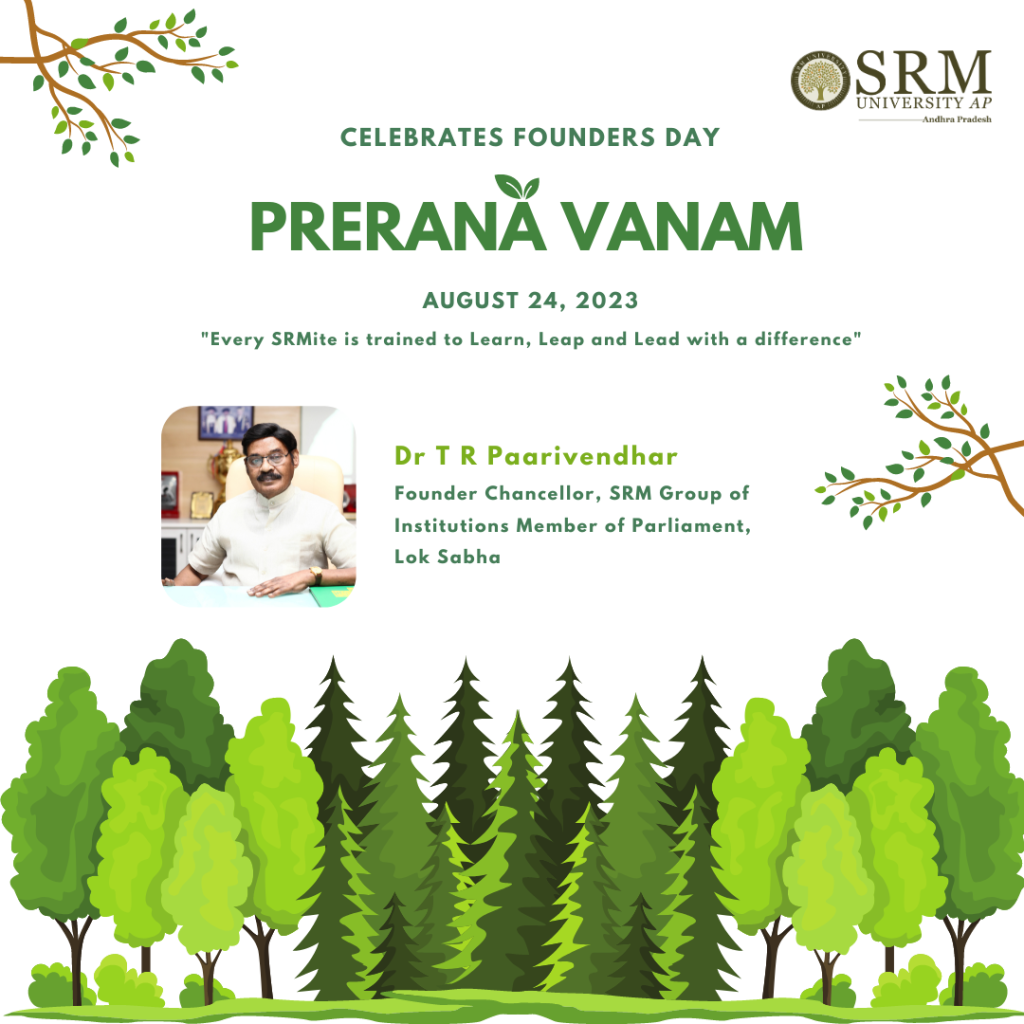
Dr T R Paarivendhar, a remarkable visionary, leader, philanthropist, and educator, serves as a profound inspiration to numerous individuals. The community of students, faculty, and staff at SRM University-AP came together to commemorate this extraordinary human being on his birthday on August 24, 2023. Dr Paarivendhar’s forward-thinking concepts and his will to serve humanity have given rise to this esteemed institution.
On this occasion of Founder’s Day, the university witnessed the active participation of enthusiastic students, faculty, and staff, thereby significantly enhancing the impact of the event. As part of the festivities, SRM AP also hosted an annual tree plantation campaign called “Prerna Vanam” both on the campus and in Venkatapalem. Additionally, the celebrations encompassed the distribution of fruits to local orphanages and elderly care homes.
Vice Chancellor, Prof. Manoj K Arora while addressing the students reminded them of our Founder Chancellor, Dr T R Paarivendhar’s desire to transform the varsity as a “university of leaders and change-makers.” He stressed upon our founder’s vision to develop the university as one of the best in the world. Prof. Arora also took the opportunity to highlight the necessity of developing an entrepreneurial mindset among students. He coaxed the students to work towards realising our Founder’s dream. The event was clubbed with the ongoing Fresher’s Orientation session, UDAAN and saw the presence of rural enthusiast and start-up coach, Mr Atul Mittal.
The celebration saw the participation of students, faculty and members of the university leadership.
- Published in News, University Event
UDAAN Offers Fresh Perspectives to its New Cohort of Students
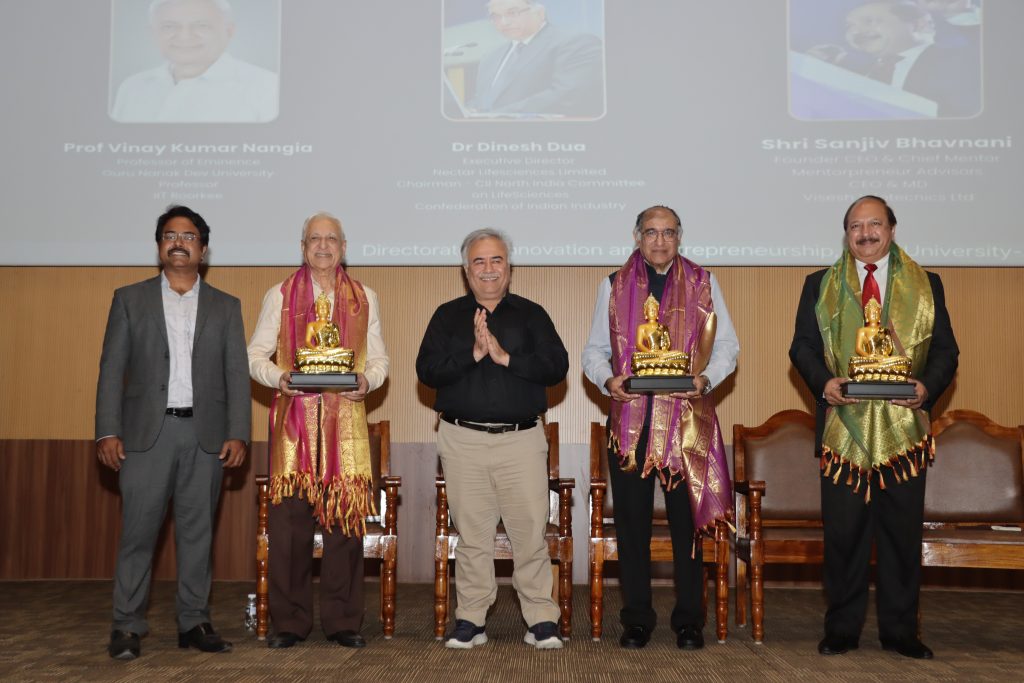
SRM University-AP warmly welcomes its latest cohort of students. The university’s freshers’ orientation, named UDAAN, is currently underway, featuring a comprehensive series of sessions scheduled from August 16 to August 24. These sessions have been meticulously designed to introduce and integrate the students into campus life and academic
The array of multiple sessions includes an introductory segment that attunes the students to the university’s various directorates, departments, campus layout, and the academic ecosystem it offers. Moreover, the sessions encompass expert-led talks from diverse domains, featuring luminaries from the industry.
On August 19th, a pivotal declaration was made, designating the year 2023-2024 as “The Year of Entrepreneurship” on campus. This decision was met with fervour as industry experts encouraged the cultivation of an entrepreneurial mindset among the students.
In a joint session with Prof. Vinay Nangia, Dr Dinesh Dua, Executive Director Nectar Life Sciences Limited; Mr Sanjiv Bhavnani, Founder CEO & Chief Mentor, Entrepreneur Advisors; the guests spoke of the need to develop an entrepreneurial mindset.
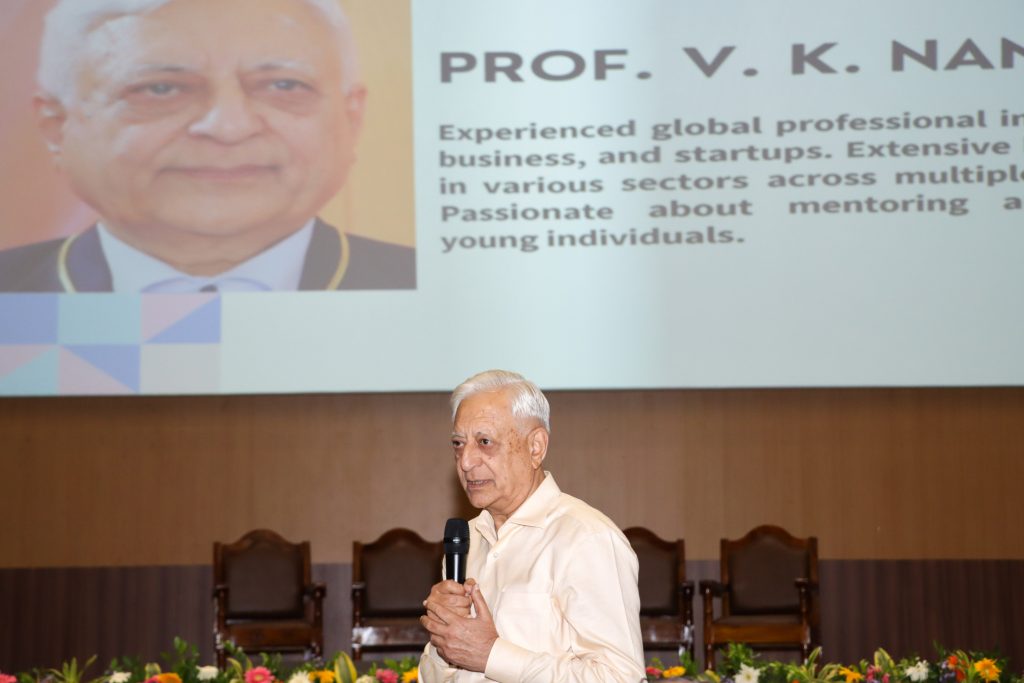 Prof. Nangia emphasised that today the world is moving very fast, and technology, machines and now AI have been taking over the tasks that previously were manual. He recounted that when he was a student, land, labour and capital were the factors of production and this was the time when industries were coming to India and getting a job was a lucrative option. But today in the service sector, ideas, innovation, entrepreneurship and money have taken the foreground and in this context, entrepreneurship is the only solution to the growing problems of the economy. He also said that, in the coming future jobs are going to disappear and entrepreneurship will replace them.
Prof. Nangia emphasised that today the world is moving very fast, and technology, machines and now AI have been taking over the tasks that previously were manual. He recounted that when he was a student, land, labour and capital were the factors of production and this was the time when industries were coming to India and getting a job was a lucrative option. But today in the service sector, ideas, innovation, entrepreneurship and money have taken the foreground and in this context, entrepreneurship is the only solution to the growing problems of the economy. He also said that, in the coming future jobs are going to disappear and entrepreneurship will replace them.
Dr Dinesh Dua as he addressed the students recounted motivating stories of entrepreneurs who didn’t give up and ultimately succeeded. Dr Dua tried to instil the concept in the minds of all that the spirit of entrepreneurship is in never giving up no matter how many times you fail.
Mr Bhavnani in his talk urged the students to step out of their comfort zones, he stressed upon the point that unless one ventures out of their comfort zones one is not progressing at all. The confidence that one develops from stepping out of the comfort zone will enable one to do well in life, build fortunes and a name for oneself.
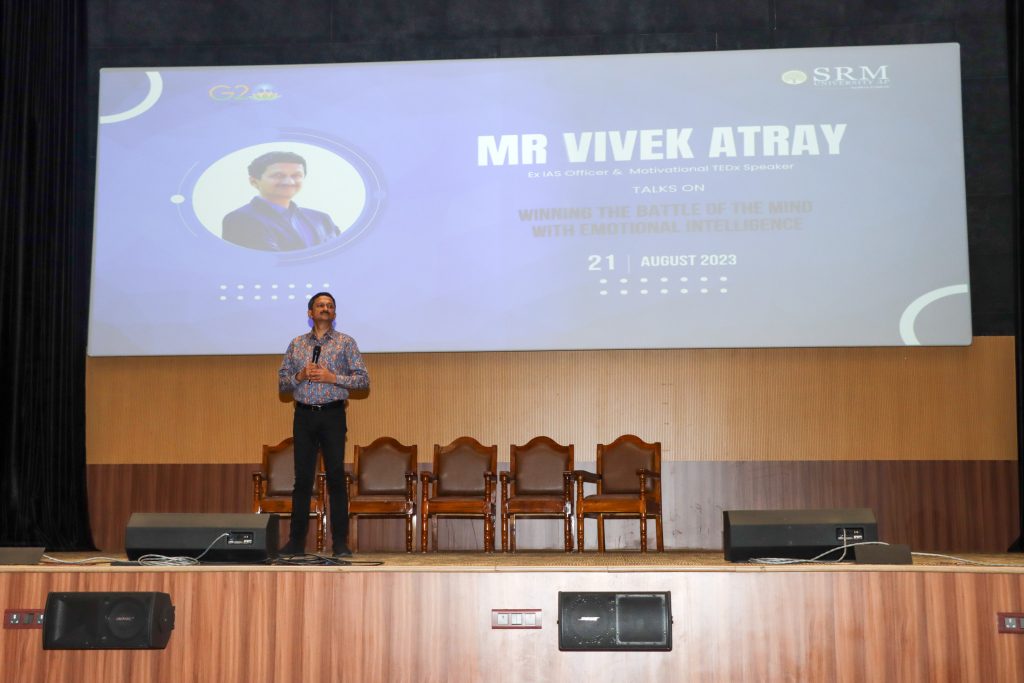 An especially notable session took place on August 21st, where the resource person, Mr Vivek Atray, an esteemed ex-IAS officer, expounded on the significance of the “3 I’s”: Inspiration, Integrity, and Innovation. This enlightening discourse also emphasised the importance of subtracting the self, symbolising humility and selflessness.
An especially notable session took place on August 21st, where the resource person, Mr Vivek Atray, an esteemed ex-IAS officer, expounded on the significance of the “3 I’s”: Inspiration, Integrity, and Innovation. This enlightening discourse also emphasised the importance of subtracting the self, symbolising humility and selflessness.
Mr Atray’s session was followed by Mr Shiven Tandon, a chartered account and motivational speaker who further discoursed how to “Master the Mind” where he emphasised the need to reject the unworthy, to focus on nothing but the best for oneself. Dr Nived Chebrolu, a post doctoral scholar from the Oxford Robotics Institute in the United Kingdom took a session on ” Mapping with Field Robots in Tough Environments” on August 25, 2023.
Every session offered an ideal blend of motivation and enlightenment. The experts drew from their personal journeys, imparting insights into the dynamic path that lies ahead for the students.
- Published in News, University Event
77th Independence Day Celebrations at SRM University-AP
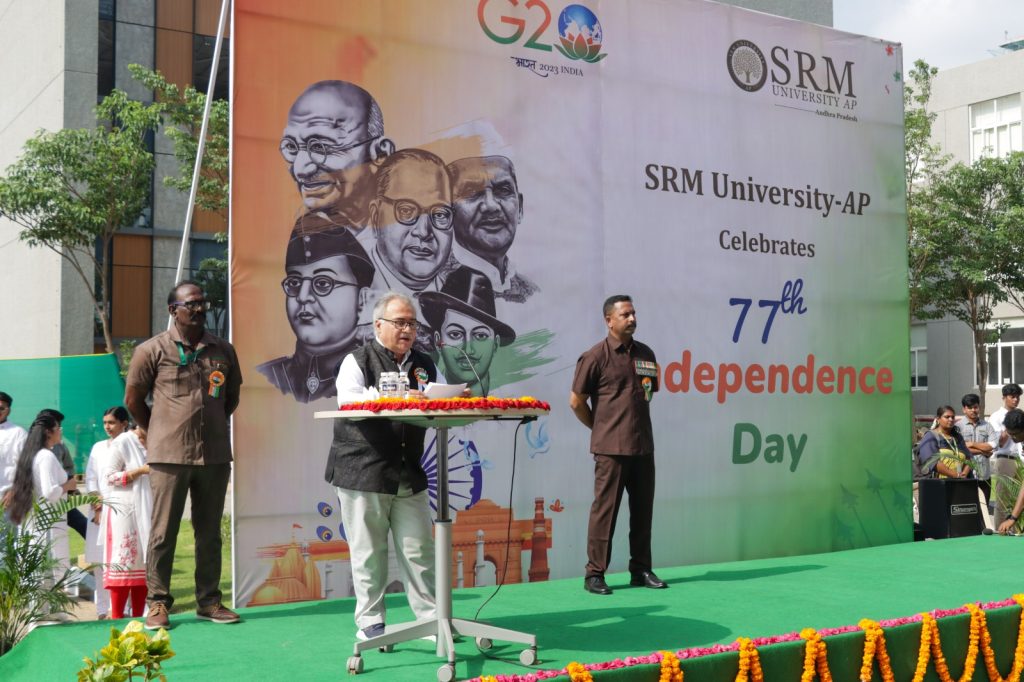
The 77th Independence Day was celebrated at SRM University-AP with a lot of patriotic fervour. Vice Chancellor Prof. Manoj K Arora hoisted the national flag and signalled the commencement of the festivities.
Prof. Arora highlighted the tremendous progress made over the 76 years since independence, attributing this success to virtues such as patience, resilience, honesty, hard work, and dedication. He recalled the words of the Hon’ble President of India, Draupadi Murmu, who underscored our shared Indian identity transcending barriers of caste, creed, and religion.
Vice Chancellor Prof. Manoj K Arora also recounted SRM University-AP‘s achievements in the past year, applauding not only the faculty and staff but also acknowledging the contributions of security guards, housekeeping personnel, plumbers, technicians, and construction workers, all of whom were cheered by the audience.
Prof. Arora reminded everyone of the university’s strategic goals for the next 5 years, urging collective efforts to realise these ambitions. He expressed confidence that by the end of this period, SRM University-AP would achieve recognition not just nationally, but globally.
Dr R Premkumar, Registrar SRM University-AP; Prof. Bharadwaj Sivakumar, Dean Paari School of Business, Prof. Ranjit Thapa Dean in-charge, School of Engineering and Sciences, Mr Pankaj Belwariar, Director Communications and other faculty and staff were attendance of the festivities.
The programme also witnessed an awe-inspiring parade organised by Campus Life Management and several cultural activities that were put up by the student community.
- Published in News, University Event
Governor Shri Biswabhusan Harichandan inaugurated ISRO & DAE Exhibition in SRM University-AP
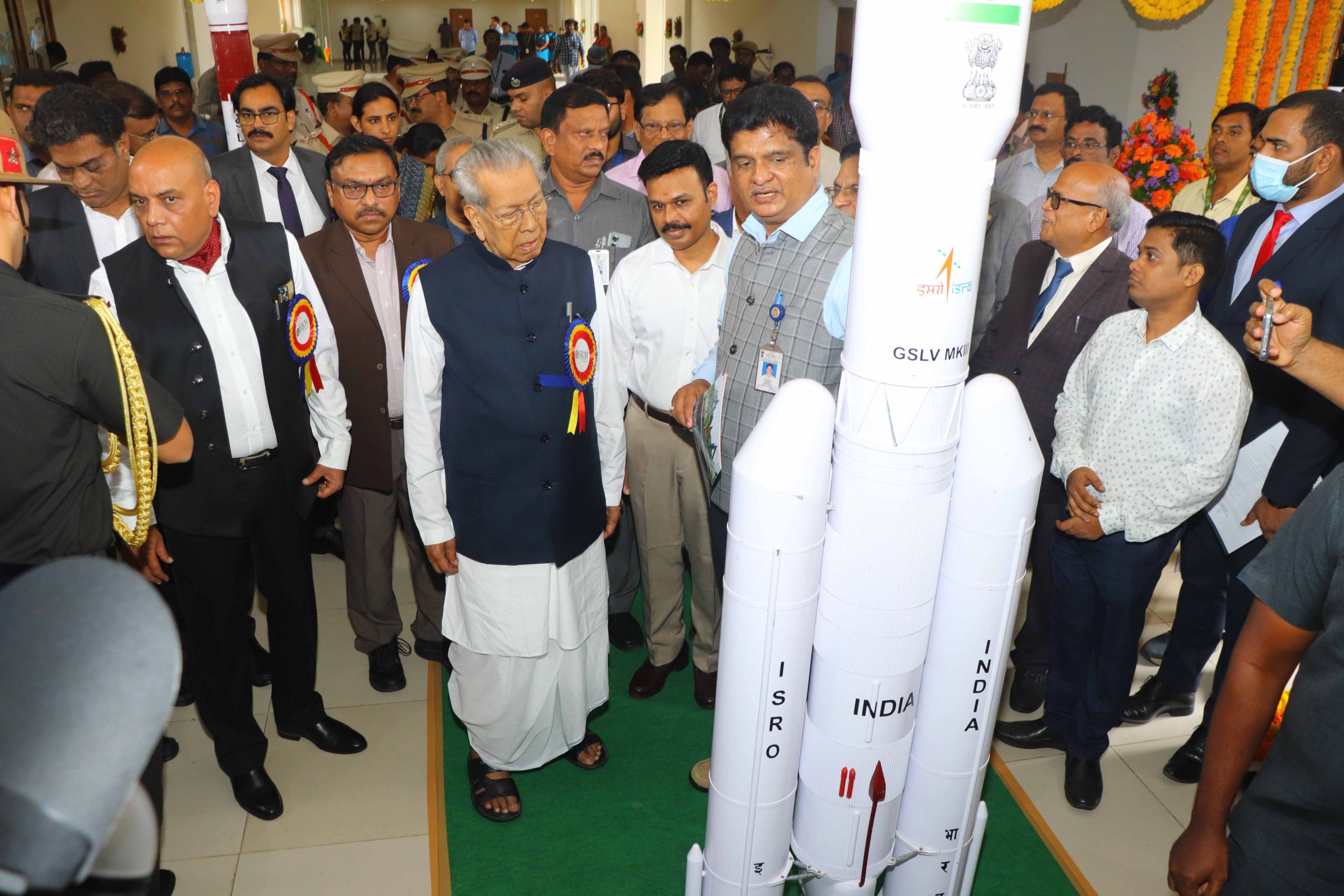 “The societal expectations from science and technology are increasing. Thus, the scientific community has the responsibility to rise to the expectations” said Hon’ble governor to the intellectual gathering.
“The societal expectations from science and technology are increasing. Thus, the scientific community has the responsibility to rise to the expectations” said Hon’ble governor to the intellectual gathering.
Governor of Andhra Pradesh, Shri Biswabhusan Harichandan inaugurated the Science and Technology Exhibition, by ISRO and DAE, at SRM University-AP, Andhra Pradesh, on November 03, 2022. The exhibition, organised as a prelude to 88th Annual meeting of the Indian Academy of Sciences, will be open till November 06 on the campus.
“It is known that science and technology are the established currency of the geo-political world. Any country that has made advances in prosperity has invariably depended on science and technology”, remarked Sri Biswabhusan Harichandan addressing the science and technology enthusiasts from all over the country. He reiterated Prime Minister Shri Narendra Modi’s vision of the nation – “Jai Jawan, Jai Kisan, Jai Vigyan, Jai Anusandhan”. He further said that “a developed nation is one that has the capacity for wealth, literacy, high quality of life and national security . This is your country, be proud of it, go ahead and our great ambition of Athmanirbhar will be fulfilled through each one of us”, to the audience of school students came from different parts of the state to attend the exhibition.
Addressing the gathering, Prof Umesh Waghmare, President of the Indian Academy of Sciences (IASc), emphasized that the important mandate of IASc is to uphold the cause of progress and to connect with society through the domain of science and technology. “I am really excited to associate with the students through the exhibitions and meetings organised at SRM AP”, he added.
Prof Manoj K Arora, Vice Chancellor of SRM University- AP, delivered the welcome address and highlighted the achievements of the university in the past five years. Pro-Chancellor, Dr P Sathyanarayanan emphasised the impact of Campus Social Responsibility for the progress of the country. “It is our proud privilege to host the 88th Annual Meeting of IASc at our university campus”, he added. Pro Vice- Chancellor, Prof D Narayana Rao highlighted the achievements of Indians trained in the Athmanirbhar India. He lauded the proactive application of science and technology and the insatiable quest for research and development in the areas of national priority such as world-class communications and remote sensing satellites.
Dr. Pola Bhaskar IAS, Commissioner of Collegiate Education; SRM AP Registrar and many other dignitaries from Indian Academy of Sciences and State and Central government were present on the inaugural function.
Around 1000 students from different schools across the state participated in the first day of Science and Technology Exhibition. The exhibition aims to be an engaging and invigorating platform for students from various regions.There are demonstration models of rocket energy, space research, and nuclear technology, interactive videos on the evolution of technology in ISRO and DAE, and meetup with renowned scientists and technologists. Participants can converse with eminent scientists and researchers on their pathbreaking research works. Apart from the pioneering research models, the exhibition proffers a brief account of various career opportunities at ISRO and DAE. The exhibition will last for the next four days and will be open to the participants free of cost.
In Media: Press Coverage- Published in News, University Event


